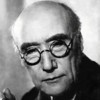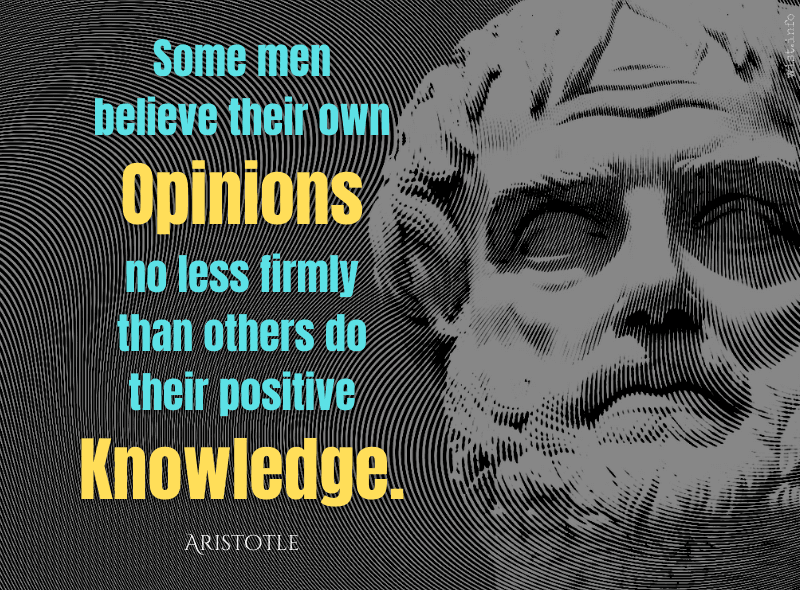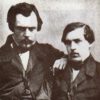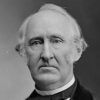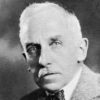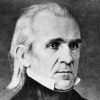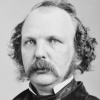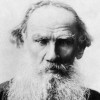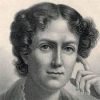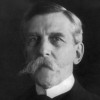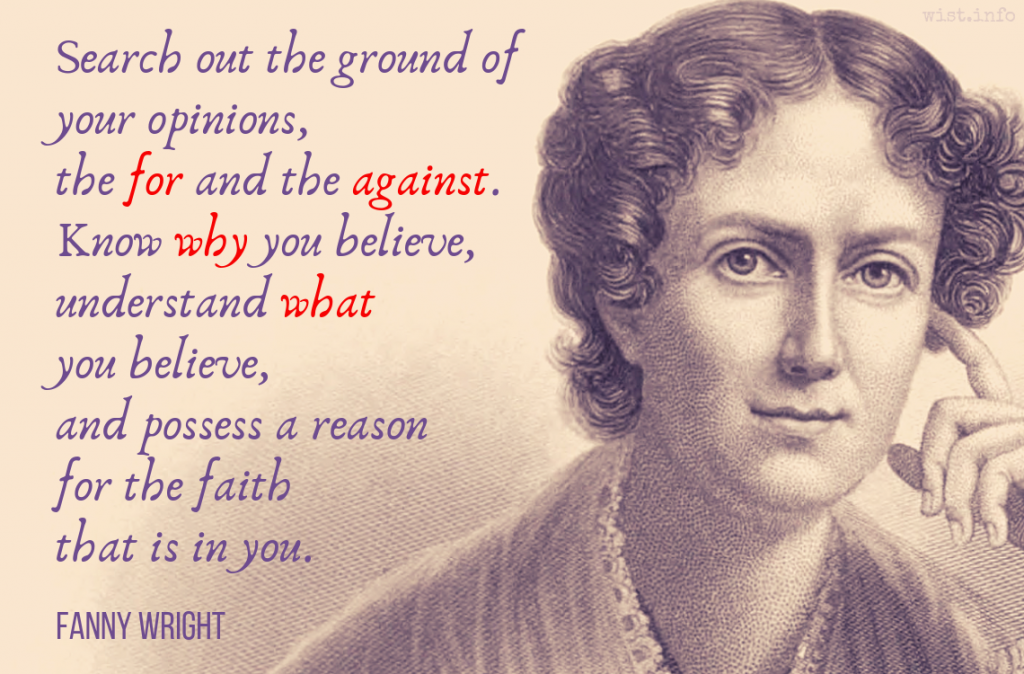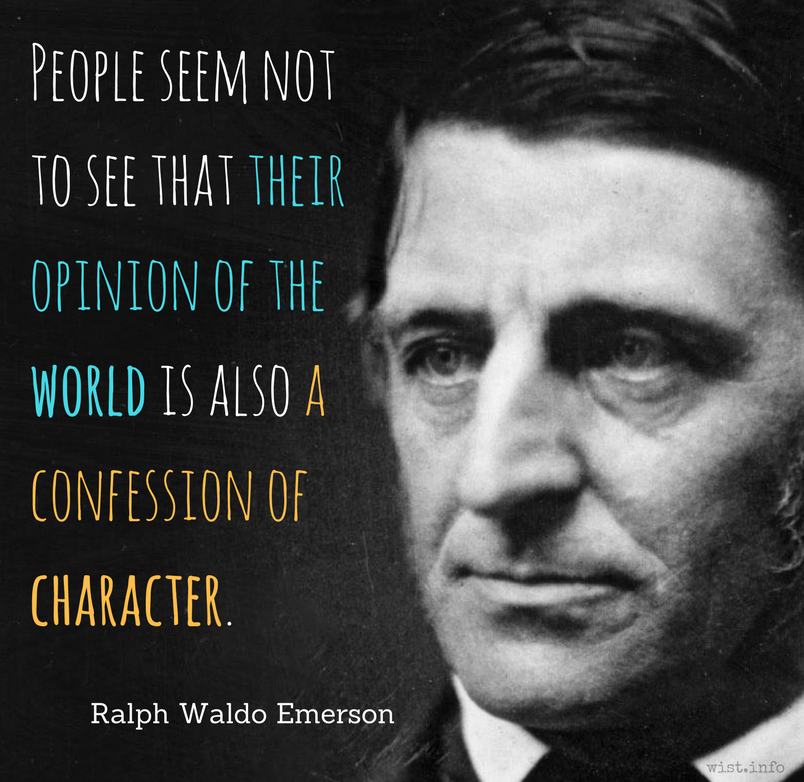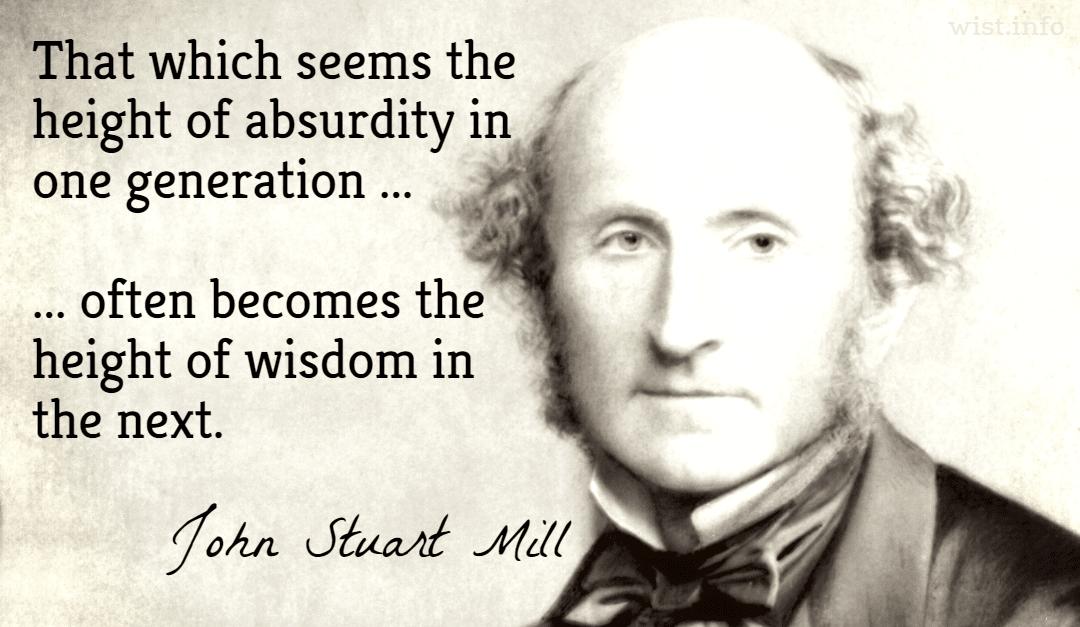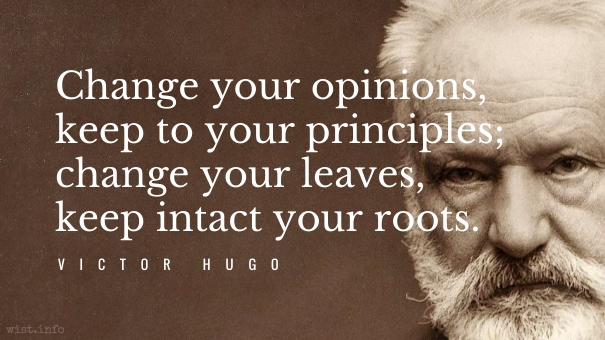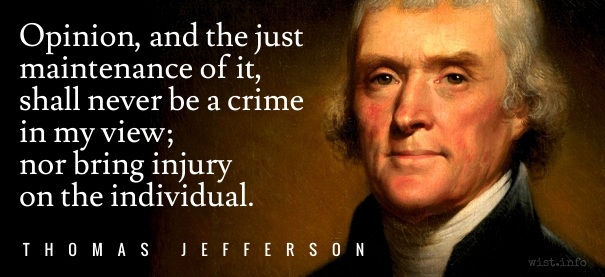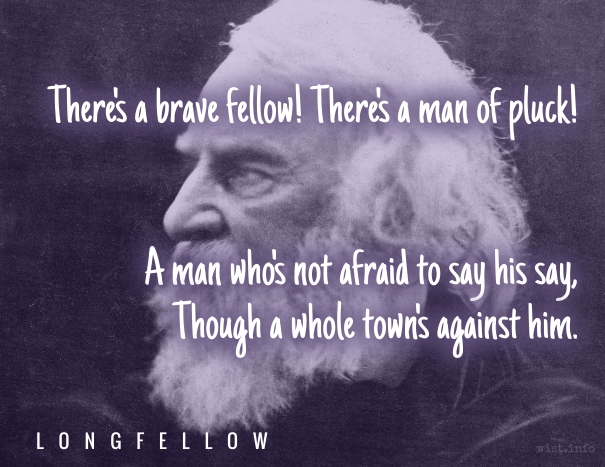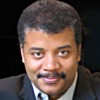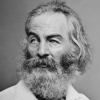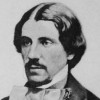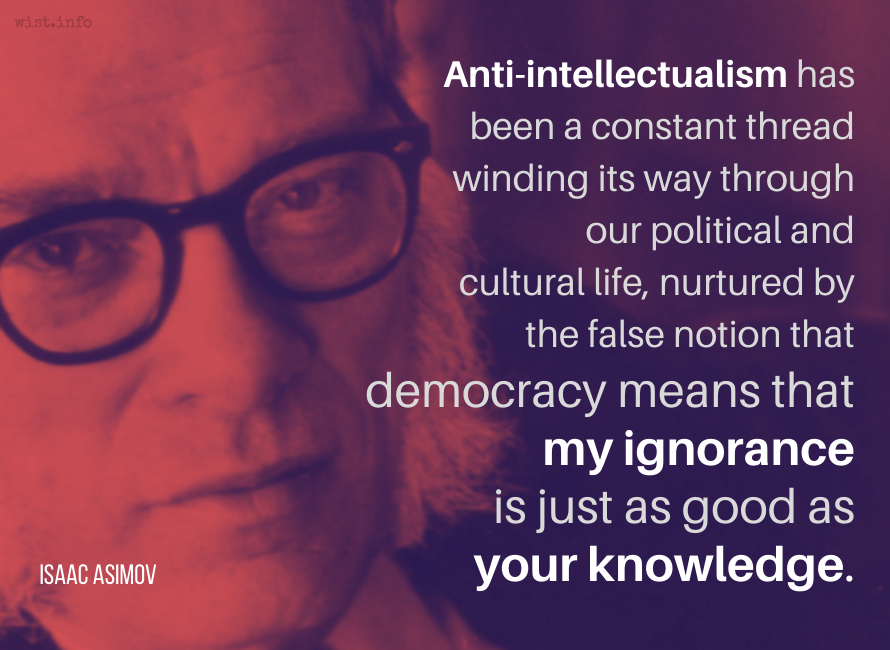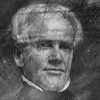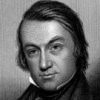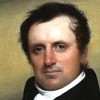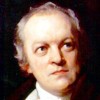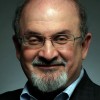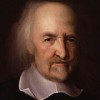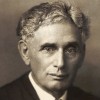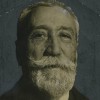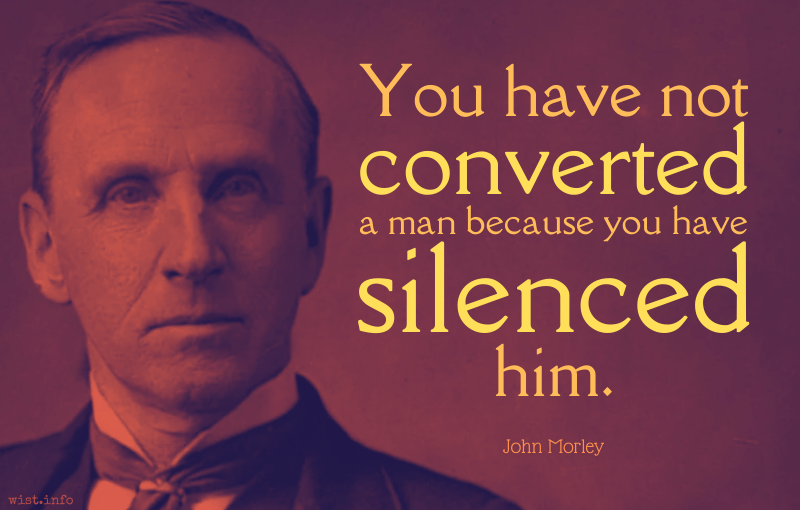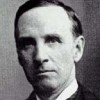All opinions are not equal. Some are a very great deal more robust, sophisticated and well supported in logic and argument than others.
Douglas Adams (1952-2001) English author, humourist, screenwriter
Interview (1998-99, Winter) with David Silverman, American Atheist magazine
(Source)
Reprinted in The Salmon of Doubt, Part 2 "The Universe," "Interview, American Atheists" (2002) [ed. Peter Guzzardi]
Quotations about:
opinion
Note not all quotations have been tagged, so Search may find additional quotes on this topic.
Beliefs must be lived in for a good while, before they accommodate themselves to the soul’s wants, and wear loose enough to be comfortable.
CALVIN: I’m thinking of starting my own talk radio show. I’ll spout simplistic opinions for hours on end, ridicule anyone who disagrees with me, and generally foster divisiveness, cynicism, and a lower level of public dialogue!
HOBBES: It would seem you were born for the job.
CALVIN: Imagine getting paid to act like a six-year-old!
When a fact can be demonstrated, force is unnecessary; when it cannot be demonstrated, an appeal to force is infamous. In the presence of the unknown all have an equal right to think.
Robert Green Ingersoll (1833-1899) American lawyer, agnostic, orator
Lecture (1873-12) “Individuality,” Chicago Free Religious Society
(Source)
Full title "Arraignment of the Church and a Plea for Individuality." Collected in The Gods and Other Lectures (1876).
In short, if youth is not quite right in its opinions, there is a strong probability that age is not much more so.
A judgment can be refuted, but never a prejudice.
[Ein Urtheil läßt ſich widerlegen, aber niemals ein Vorurtheil.]
Marie von Ebner-Eschenbach (1830-1916) Austrian writer
Aphorisms [Aphorismen], No. 4 (1880) [tr. Scrase/Mieder (1994)]
(Source)
(Source (German)). Alternate translation:An opinion can be controverted; a prejudice, never.
[tr. Wister (1883)]
Know how to rank beliefs not according to their plausibility but by the harm they may cause.
Nassim Nicholas Taleb (b. 1960) Lebanese-American essayist, statistician, risk analyst, aphorist
The Black Swan, Part 2, ch. 13 “Appelles the Painter, or What Do You Do If You Cannot Predict” (2007)
(Source)
What you were sure of yesterday, you know now to be false, but what you are sure of today is absolutely true.
Mignon McLaughlin (1913-1983) American journalist and author
The Neurotic’s Notebook, ch. 10 (1963)
(Source)
Often an opinion, a custom, seems absurd when we are young, and advancing in life, we find the reason. Mustn’t we conclude that certain habits aren’t so ridiculous? One is lead to think sometimes that they were established by people who had read the entire book of life, and that they are judged by people who, despite their esprit, have only read a few pages.
[Souvent une opinion, une coutume commence à paraître absurde dans la première jeunesse, et en avançant dans la vie, on en trouve la raison; elle paraît moins absurde. En faudrait-il conclure que de certaines coutumes sont moins ridicules? On serait porté à penser quelquefois qu’elles ont été établies par des gens qui avaient lu le livre entier de la vie, et qu’elles sont jugées par des gens qui, malgré leur esprit, n’en ont lu que quelques pages.]
Nicolas Chamfort (1741-1794) French writer, epigrammist (b. Nicolas-Sébastien Roch)
Products of Perfected Civilization [Produits de la Civilisation Perfectionée], Part 1 “Maxims and Thoughts [Maximes et Pensées],” ch. 1, ¶ 21 (1795) [tr. Siniscalchi (1994)]
(Source)
Compare to also Chamfort.(Source (French)). Alternate translations:Often in early youth an opinion or custom seems absurd to us, which, with advancing years, we discover has some justification and so appears less absurd. Ought we to conclude from this that certain customs are not so ridiculous as others? One might sometimes be tempted to think that they were established by people who had read the book of life through, and that they are judged by those who, despite their intelligence, have only glanced at a few pages.
[tr. Hutchinson (1902)]Often an opinion or custom seems absurd to us in early youth; but as we advance in life we see the reason for it, and it appears less fatuous. Must we conclude from this that certain customs actually are less absurd? One is sometimes led to suppose that they have been established by folk who have read the whole of the book of life, and that they are criticized by those who, in spite of their intelligence, have only read a page or two at best.
[tr. Mathers (1926)]Often an opinion, a custom, seems absurd to begin with, when one is very young, and as one advances in life one learns the reason for it, and it seems less so. Must one conclude, then, that certain customs have become less ridiculous? At times one is drawn to the conclusion that they were established by persons who had read the book of life entire, and are judged by others who have read only a few pages.
[tr. Merwin (1969)]Often an opinion, or a custom, begins to seem absurd in one's early youth, and, as life advances, one finds the reason for it; it seems less absurd. Is one ot conclude that certain customs are less ridiculous? One would sometimes be inclined to think that they had been laid down by people who had read the entire book of life, and that they are judged by people who, in spite of their intellect, have only read a few pages of it.
[tr. Pearson (1973)]To the very young some opinions or customs seem absurd, but as you grow older you realize the reason behind them and they seem less absurd. Are we to conclude that certain customs aren't as ridiculous as they seem? There are times when you feel that they've been created by people who've read the book of life from cover to cover and that they're being judged by those who, however intelligent, have read only a few pages.
[tr. Parmée (2003), ¶ 20]
When the old man waggles his head and says, “Ah, so I thought when I was your age,” he has proved the youth’s case. Doubtless, whether from growth of experience or decline of animal heat, he thinks so no longer; but he thought so while he was young; and all men have thought so while they were young, since there was dew in the morning or hawthorn in May; and here is another young man adding his vote to those of previous generations and riveting another link to the chain of testimony.
Should you happen to notice that another person is extremely tall or overweight, eats too much or declines convivial drinks, has red hair or goes about in a wheelchair, ought to get married or ought not to be pregnant — see if you can refrain from bringing these astonishing observations to that person’s attention.
Judith Martin (b. 1938) American author, journalist, etiquette expert [a.k.a. Miss Manners]
“Miss Manners,” syndicated column (1986-01-19)
(Source)
As we go catching and catching at this or that corner of knowledge, now getting a foresight of generous possibilities, now chilled with a glimpse of prudence, we may compare the headlong course of our years to a swift torrent in which a man is carried away; now he is dashed against a boulder, now he grapples for a moment to a trailing spray; at the end, he is hurled out and overwhelmed in a dark and bottomless ocean. We have no more than glimpses and touches; we are torn away from our theories; we are spun round and round and shown this or the other view of life, until only fools or knaves can hold to their opinions.
Because I have reached Paris, I am not ashamed of having passed through Newhaven and Dieppe. They were very good places to pass through, and I am none the less at my destination. All my old opinions were only stages on the way to the one I now hold, as itself is only a stage on the way to something else.
Did you ever think what a waste it would be if you burned a man for what he believed at twenty, when what he might believe and write at forty would be hailed as the most blessed of holy writ?
Ellis Peters (1913-1995) English writer, translator [pseud. of Edith Mary Pargeter, who also wrote under the names John Redfern, Jolyon Carr, Peter Benedict]
The Heretic’s Apprentice, ch. 13 [Elave] (1990)
(Source)
Speak fair; and think what thou wilt.
Thomas Fuller (1654-1734) English physician, preacher, aphorist, writer
Introductio ad Prudentiam, Vol. 1, # 26 (1725)
(Source)
In a republic, to be successful we must learn to combine intensity of conviction with a broad tolerance of difference of conviction. Wide differences of opinion in matters of religious, political, and social belief must exist if conscience and intellect alike are not to be stunted, if there is to be room for healthy growth. Bitter internecine hatreds, based on such differences, are signs not of earnestness of belief but of that fanaticism which, whether religious or anti-religious, democratic or anti-democratic, is itself but a manifestation of the gloomy bigotry which has been the chief factor in the downfall of so many, many nations.
Theodore Roosevelt (1858-1919) American politician, statesman, conservationist, writer, US President (1901-1909)
Speech (1910-04-23), “Citizenship in a Republic [The Man in the Arena],” Sorbonne, Paris
(Source)
Hate not Opinions for being contrary to thy own, nor be angry to see a Difference between thine and other Men’s Judgment. Thou art not bound to rectify all Men’s Mistakes. And it is not certain, but thou thy self mayst be in the wrong.
Thomas Fuller (1654-1734) English physician, preacher, aphorist, writer
Introductio ad Prudentiam, Vol. 1, # 1228 (1725)
(Source)
A good Cause doth not want any Bitterness to support it, as a bad one cannot subsist without it. It is indeed observable, that an Author is scurrilous in proportion as he is dull; and seems rather to be in a Passion, because he cannot find out what to say for his own Opinion, than because he has discovered any pernicious Absurdities in that of his Antagonists.
Joseph Addison (1672-1719) English essayist, poet, statesman
Essay (1716-06-29), The Freeholder, No. 55
(Source)
We find a book eloquent not only when it forms our emotions, but also when it fortifies our opinions.
[Nous trouvons éloquent dans les livres, non-seulement tout ce qui augmente nos passions, mais aussi tout ce qui augmente nos opinions.]Joseph Joubert (1754-1824) French moralist, philosopher, essayist, poet
Pensées [Thoughts], ch. 23 “Des Qualités de l’Écrivain [Of the Qualities of Writers],” ¶ 157 (1850 ed.) [tr. Collins (1928), ch. 22]
(Source)
(Source (French)). Alternate translation:
In books we take for eloquence not only all that strengthens our passions, but also whatever strengthens our opinions. [tr. Lyttelton (1899), ch. 22, ¶ 74]
The difficult part of an argument is not to defend one’s opinion, but rather to know it.
André Maurois (1885-1967) French author [b. Émile Salomon Wilhelm Herzog]
Conversation, “Action in Conversation” (1930)
(Source)
And lead weights to your feet may my words be,
that you move slowly, like a weary man,
to the ‘yes’ and ‘no’ of what you do not see.
For he is a fool, and low among his kind,
who answers yea or nay without reflection,
nor does it matter on which road he runs blind.
Opinions too soon formed often deflect
man’s thinking from the truth into gross error,
in which his pride then binds his intellect.
[E questo ti sia sempre piombo a’ piedi,
per farti mover lento com’ uom lasso
e al sì e al no che tu non vedi:
ché quelli è tra li stolti bene a basso,
che sanza distinzione afferma e nega
ne l’un così come ne l’altro passo;
perch’ elli ’ncontra che più volte piega
l’oppinïon corrente in falsa parte,
e poi l’affetto l’intelletto lega.]Dante Alighieri (1265-1321) Italian poet
The Divine Comedy [Divina Commedia], Book 3 “Paradiso,” Canto 13, l. 112ff (13.112-121) [Thomas Aquinas] (1320) [tr. Ciardi (1970)]
(Source)
(Source (Italian)). Alternate translations:Now learn, my Son,
With tardy foot to make your Judgment run,:
And Fancy's wild excursions to repel
Unhappy they, who, by her lure betray'd.
And, like 'lorn travellers, by meteors led.
Their affirmation or denial give
Unweigh'd, for Fancy leans to Falsehood's part,
And soon to Passion's rule betrays the heart.
And her embruted Slaves in bondage live.
[tr. Boyd (1802), st. 19-20]And let this
Henceforth be led unto thy feet, to make
Thee slow in motion, as a weary man,
Both to the ‘yea’ and to the ‘nay’ thou seest not.
For he among the fools is down full low,
Whose affirmation, or denial, is
Without distinction, in each case alike
Since it befalls, that in most instances
Current opinion leads to false: and then
Affection bends the judgment to her ply.
[tr. Cary (1814)]Let this henceforth be lead unto thy feet,
To make thee move slow, like a weary man,
Both to the Yea and Nay, as far 's you can:
For he among the fools is low enough,
Without distinction, who affirms, denies,
Where one and where the other question lies.
It happens, too, that oftentimes incline
Opinions current to the falser side,
And intellect is by affection tied.
[tr. Bannerman (1850)]And lead shall this be always to thy feet,
To make thee, like a weary man, move slowly
Both to the Yes and No thou seest not;
For very low among the fools is he
Who affirms without distinction, or denies,
As well in one as in the other case;
Because it happens that full often bends
Current opinion in the false direction,
And then the feelings bind the intellect.
[tr. Longfellow (1867)]And let this be always as lead to thy feet, to make thee move slow as a weary man both to the yes and to the no that thou seest not; for he is very low down among the fools who affirms or denies without distinction, in the one no less than in the other pass: since it occurs that oftentimes the current opinion swerves in a false direction, and afterwards the desire binds the understanding.
[tr. Butler (1885)]And let this to thy feet a dead weight be,
Like one fatigued to make thee journey slow
Towards the Yes, or No, thou dost not see.
For he amongst the fools is very low,
Who without thought affirmeth, or denies,
Whether to one or other step he go;
Because it happens that too often flies
Public opinion into error's part.
And then its influence the intellect ties.
[tr. Minchin (1885)]And let this be ever as lead to thy feet, to make thee move slow as a weary man, both to the YES and to the NO which thou seest not; for he is very low among the fools who affirms or denies without distinction, alike in the one and in the other case: because it happens, that oftentimes the current opinion bends in false direction, and then the inclination binds the understanding.
[tr. Norton (1892)]And let this ever be lead to thy feet, to make The thee move slow, like a weary man ; both to the yea and nay thou seest not;
for he is right low down amongst the fools who maketh affirmation or negation without distinction between case and case;
wherefore it chanceth many times swift-formed rash opinion leaneth the wrong way, and then con-ceit bindeth the intellect.
[tr. Wicksteed (1899)]And let this always be lead on thy feet to make thee slow, like a weary man, in moving either to the yea or the nay where thou dost not see clearly; for he ranks very low among the fools, in the one case as in the other, who affirms or denies without distinguishing, since it often happens that a hasty opinion inclines to the wrong side and then the feelings bind the intellect.
[tr. Sinclair (1939)]Ever let this, like lead, thy feed down-weigh
To make thee, where thou see'st not clear, move slow,
Like one who is weary, both to Yea and Nay.
For he among the foolish stands right low
Who affirms without distinction or denies
With whichsoever case he hast o do;
Since often it haps that rashness of surmise
Leadeth the judgment on false roads to start;
Then fond desire the understanding ties.
[tr. Binyon (1943)]And to thy feet be this hobble, wrought
Of lead, to make thee move at sluggard pace
Toward Yea and Nay where thou perceivest naught,
For low among the dunces is his place
Who hastes to accept or reject
With no distinction made 'twixt case and case;
Thence come rash judgements, mostly incorrect
And prejudiced, and stubborn all the more
That self-conceit shackles the intellect.
[tr. Sayers/Reynolds (1962)]And let this ever be as lead to your feet, to make you slow, like a weary man, in moving either to the yes or the no which you see not; for he is right low down among the fools, alike in the one asnd in the other case, who affirms or denies without distinguishing; because it happens that oftentimes hasty opinion inclines to the wrong side, and then fondness for it binds the intellect.
[tr. Singleton (1975)]And let this always make your feet like lead
So that you move like a man who is worn out
Towards a Yes or No you cannot actually see:
For a man is right down among the fools
In the case either of affirmation or denial,
If he proceeds without making distinctions;
Because it often happens that a quick opinion
Inclines int he wrong direction, and after that
The intellect is hampered by vanity.
[tr. Sisson (1981)]And let this weigh as lead to slow your steps,
to make you move as would a weary man
to yes or no when you do not see clearly:
whether he would affirm or would deny,
he who decides without distinguishing
must be among the most obtuse of men;
opinion -- hasty -- often can incline
to the wrong side, and then affection for
one’s own opinion binds, confines the mind.
[tr. Mandelbaum (1984)]Let this be leaden weight upon your feet
to make you move slow as a weary man
both to the ‘yes’ or ‘no’ you do not see,
for he ranks low, indeed, among the fools,
who rushes to affirm or to deny,
no matter which, without distinguishing.
Opinions formed in haste will oftentimes
lead in a wrong direction, and man’s pride
then intervenes to bind his intellect.
[tr. Musa (1984)]And let this ever be lead upon your feet, to make you move slowly, like a weary man, to both the yes and the no that you do not see:
for surely he is low among the fools who affirms and denies without distinction in either case,
for it often happens that a hasty opinion turns in a wrong direction, and then affect binds the intellect.
[tr. Durling (2011)]And let this always weight your feet down with lead, and make you go slowly, like a tired man, approaching the yes or no you do not grasp, since he is truly down there among the fools, who affirms or denies without distinguishing between cases, so that it often happens that a quick opinion leans to the wrong side, and then Pride entangles the intellect.
[tr. Kline (2002)]And let this be a lead weight on your feet,
so that you move as slow as if worn out
to any “yes” or “no” unclear to you.
For no fool is as low a fool as one
who taking either of these steps will fail
affirming to denying in distinction.
So often when our judgement rushes on
it happens that we veer in false directions
and then emotions bind tie intellect.
[tr. Kirkpatrick (2007)]And let this always be as lead upon your feet
to make you slow, just like a weary man, in moving,
whether to yes or no, unless you see both clearly.
For he ranks low among the fools
who, without making clear distinctions,
affirms or denies in one case or another,
since it often happens that a hasty opinion
inclines one to the erring side, and then
fondness for it fetters the working of the mind.
[tr. Hollander/Hollander (2007)]And let this forever be like lead on your feet,
Forcing you to go slowly, like someone weary,
Saying 'yes' or 'no' when neither is clear.
A man who either concurs or disagrees
Without some plain distinctions is a fallen fool,
And pretty low even at that level,
For hasty judgment often bends to what's wrong,
And having made a foolish choice the fool
Holds on, letting his foolery tie up his mind.
[tr. Raffel (2010)]
BALTHASAR: For slander lives upon succession,
Forever housèd where it gets possession.William Shakespeare (1564-1616) English dramatist and poet
Comedy of Errors, Act 3, sc. 1, l. 154ff (3.1.154-155) (1594)
(Source)
To Antipholus of Ephesus.
It is customary to suppose that, if a belief is widespread, there must be something reasonable about it. I do not think this view can be held by anyone who has studied history. Practically all the beliefs of savages are absurd. In early civilizations there may be as much as one percent for which there is something to be said. In our own day …. But at this point I must be careful. We all know that there are absurd beliefs in Soviet Russia. If we are Protestants, we know that there are absurd beliefs among Catholics. If we are Catholics, we know that there are absurd beliefs among Protestants. If we are Conservatives, we are amazed by the superstitions to be found in the Labour Party. If we are Socialists, we are aghast at the credulity of Conservatives. I do not know, dear reader, what your beliefs may be, but whatever they may be, you must concede that nine-tenths of the beliefs of nine-tenths of mankind are totally irrational. The beliefs in question are, of course, those which you do not hold.
Bertrand Russell (1872-1970) English mathematician and philosopher
“Is There a God?” (1952)
(Source)
Essay commissioned by Illustrated magazine in 1952, but never published there. First publication in Russell, Last Philosophical Testament, 1943-68 (1997) [ed. Slater/Köllner].
The great misfortune, the root of all the evil to come, was the loss of faith in the value of personal opinions. People imagined that it was out of date to follow their own moral sense, that they must all sing the same tune in chorus, and live by other people’s notions, the notions which were being crammed down everybody’s throat.
Boris Pasternak (1890-1960) Russian poet, novelist, and literary translator
Doctor Zhivago [До́ктор Жива́го], Part 2, ch. 13 “Opposite the House of Caryatids,” sec. 14 [Yury] (1955) [tr. Hayward & Harari (1958), UK ed.]
(Source)
Alternate translations:The main misfortune, the root of all evil to come, was loss of the confidence in the value of one's own opinion. People imagined that it was out of date of follow their own moral sense, that they must all sing in chorus, and live by other people's notions, notions that were crammed down everybody's throat.
[tr. Hayward & Harari (1958), US ed.]The main trouble, the root of the future evil, was loss of faith in the value of one’s own opinion. People imagined that the time when they followed the urgings of their moral sense was gone, that now they had to sing to the general tune and live by foreign notions imposed on everyone.
[tr. Pevear & Volokhonsky (2010)]
To be enlightened: a big phrase! Certain men think themselves enlightened because they are decided: thus taking conviction for truth, and strong conception for intelligence. There are others who, because they know all the words, think they know all the truths.
[Être éclairé, c’est un grand mot! Il y a certains hommes qui se croient éclairés, parce qu’ils sont décidés, prenant ainsi la conviction pour la vérité, et la forte conception pour l’intelligence. Il en est d’autres qui, parce qu’ils savent tous les mots, croient savoir toutes les vérités.]Joseph Joubert (1754-1824) French moralist, philosopher, essayist, poet
Pensées [Thoughts], ch. 4 “De la Nature des Esprits [On the Nature of Minds],” ¶ 36 (1850 ed.) [tr. Calvert (1866), ch. 5]
(Source)
(Source (French)). Alternate translations:Enlightenment -- a great word! Some men think themselves enlightened, because they are decided, taking conviction for truth, and strong conception for intelligence. Others, because they know all that can be said think that they know all truth.
[tr. Lyttelton (1899), ch. 3, ¶ 15]Enlightenment is a fine word! Some men fancy themselves enlightened because they are decisive, thus taking conviction for truth, and force of conception for intelligence. Others think that because they have every word at their command, they have every truth also.
[tr. Collins (1928), ch. 4]Because they know all the words, they think they know all the truths.
[tr. Auster (1983)], 1819 entry]
If in the following pages I seem to express myself dogmatically, it is only because I find it very boring to qualify every phrase with an ‘I think’ or ‘to my mind.’ Everything I say is merely an Opinion of my own. The reader can take it or leave it. If he has the patience to read what follows he will see that there is only one thing about which I am certain, and this is that there is very little about which one can be certain.
W. Somerset Maugham (1874-1965) English novelist and playwright [William Somerset Maugham]
The Summing Up, ch. 5 (1938)
(Source)
Most often people seek in life occasions for persisting in their opinions rather than for educating themselves.
André Gide (1869-1951) French author, Nobel laureate
“An Unprejudiced Mind,” sec. 1, Pretexts (1959) [ed. O’Brien (1964)]
(Source)
Once a man’s understanding has settled on something (either because it is an accepted belief or because it pleases him), it draws everything else also to support and agree with it. And if it encounters a larger number of more powerful countervailing examples, it either fails to notice them, or disregards them, or makes fine distinctions to dismiss and reject them, and all of this with much dangerous prejudice, to preserve the authority of its first conceptions.
[Intellectus humanus in iis quae semel placuerunt (aut quia recepta sunt et credita, aut quia delectant), alia etiam omnia trahit ad suffragationem et consensum cum illis: et licet major sit instantiarum vis et copia, quae occurrunt in contrarium; tamen eas aut non observat, aut contemnit, aut distinguendo summovet et rejicit, non sine magno et pernicioso praejudicio, quo prioribus illis syllepsibus authoritas maneat inviolata.]
Francis Bacon (1561-1626) English philosopher, scientist, author, statesman
Instauratio Magna [The Great Instauration], Part 2 “Novum Organum [The New Organon],” Book 1, Aphorism # 46 (1620) [tr. Silverthorne (2000)]
(Source)
(Source (Latin)). Alternate translations:The human understanding, when any preposition has been once laid down, (either from general admission and belief, or from the pleasure it affords,) forces every thing else to add fresh support and confirmation; and although more cogent and abundant instances may exist to the contrary, yet either does not observe or despises them, or gets rid of and rejects them by some distinction, with violent and injurious prejudice, rather than sacrifice the authority of its first conclusions.
[tr. Wood (1831)]The human understanding when it has once adopted an opinion (either as being the received opinion or as being agreeable to itself) draws all things else to support and agree with it. And though there be a greater number and weight of instances to be found on the other side, yet these it either neglects and despises, or else by some distinction sets aside and rejects; in order that by this great and pernicious predetermination the authority of its former conclusions may remain inviolate.
[tr. Spedding (1858)]The human Intellect, in those things which have once pleased it (either because they are generally received and believed, or because they suit the taste), brings everything else to support and agree with them; and though the weight and number of contradictory instances be superior, still it either overlooks or despises them, or gets rid of them by creating distinctions, not without great and in jurious prejudice, that the authority of these previous conclusions may be maintained inviolate.
[tr. Johnson (1859)]Once a human intellect has adopted an opinion (either as something it likes or as something generally accepted), it draws everything else in to confirm and support it. Even if there are more and stronger instances against it than there are in its favour·, the intellect either overlooks these or treats them as negligible or does some line-drawing that lets it shift them out of the way and reject them. This involves a great and pernicious prejudgment by means of which the intellect’s former conclusions remain inviolate.
[tr. Bennett (2017)]
Perhaps people with my point of view are in a minority today. But the fact of being in a minority does not, in itself, trouble me, nor do I see anything un-American about being in a minority position. Quite the contrary. The minority views of one day are frequently the majority views of another, and in the possibility of this being so rests all our potentiality for progress.
Jane Jacobs (1916-2006) American-Canadian journalist, author, urban theorist, activist
“No Virtue in Meek Conformity” (1952)
(Source)
Foreword to her response to a State Department Loyalty Security Board interrogatory (1952-03-25). Reprinted in Vital Little Plans (2016).
For most men (till by losing rendered sager)
Will back their own opinions by a wager.
It is particularly incumbent on those who never change their opinion, to be secure of judging properly at first.
“What think you of books?” said he, smiling.
“Books — oh! no. I am sure we never read the same, or not with the same feelings.”
“I am sorry you think so; but if that be the case, there can at least be no want of subject. We may compare our different opinions.”Jane Austen (1775-1817) English author
Pride and Prejudice, ch. 18 [Darcy and Elizabeth] (1813)
(Source)
There is virtually no opinion an individual can hold that is so outlandish that he will not find other believers on the Web.
Elizabeth Kolbert (b. 1961) American journalist and author
“The Things People Say,” The New Yorker (2009-11-02)
(Source)
It is all right to say exactly what you think if you have learned to think exactly.
Marcelene Cox (1900-1998) American writer, columnist, aphorist
“Ask Any Woman” column, Ladies’ Home Journal (1945-11)
(Source)
Cox provided a variant of this aphorism in the 1959-01 issue of LHJ: "Anyone has the right to say what he thinks, if he thinks."
To my mind, a man without a bias cannot write interesting history — if, indeed, such a man exists. I regard it as mere humbug to pretend to a lack of bias.
Bertrand Russell (1872-1970) English mathematician and philosopher
Autobiography, Vol 2: 1914-1944, ch. 6 “America, 1938-1944” (1968)
(Source)
Printers are educated in the Belief, that when Men differ in Opinion, both Sides ought equally to have the Advantage of being heard by the Publick; and that when Truth and Error have fair Play, the former is always an overmatch for the latter: Hence they chearfully serve all contending Writers that pay them well, without regarding on which side they are of the Question in Dispute.
Benjamin Franklin (1706-1790) American statesman, scientist, philosopher, aphorist
“Apology for Printers,” Philadelphia Gazette (1731-06-10)
(Source)
The delight of social relations between friends is fostered by a shared attitude to life, together with certain differences of opinion on intellectual matters, through which either one is confirmed in one’s own views, or else one gains practice and instruction through argument.
[Le plaisir de la société entre les amis se cultive par une ressemblance de goût sur ce qui regarde les moeurs, et par quelques différences d’opinions sur les sciences: par là ou l’on s’affermit dans ses sentiments, ou l’on s’exerce et l’on s’instruit par la dispute.]
Jean de La Bruyère (1645-1696) French essayist, moralist
The Characters [Les Caractères], ch. 5 “Of Society and Conversation [De la Société et de la Conversation],” § 61 (5.61) (1688) [tr. Stewart (1970)]
(Source)
(Source (French)). Alternate translations:The pleasure of Society amongst Friends is cultivated by a likeness of Inclinations, as to Manners; and a difference in Opinion, as to Sciences: the one confirms and humours us in our sentiments; the other exercises and instructs us by disputation.
[Bullord ed. (1696)]The Pleasure of Society amongst Friends, is cultivated by a likeness of Inclinations, as to Manners, and by some difference in Opinion, as to Sciences: The one confirms us in our Sentiments, the other exercises and instructs us by Disputation.
[Curll ed. (1713)]The pleasure of social intercourse amongst friends is kept up by a similarity of morals and manners, and by slender differences in opinion about science; this confirms us in our sentiments, exercises our faculties or instructs us through arguments.
[tr. Van Laun (1885)]
Violent zeal for truth has a hundred to one odds to be either petulancy, ambition, or pride.
It was one of the rules which above all others made Doctr. Franklin the most amiable of men in society, “never to contradict any body.” if he was urged to announce an opinion, he did it rather by asking questions, as if for information, or by suggesting doubts.
Thomas Jefferson (1743-1826) American political philosopher, polymath, statesman, US President (1801-09)
Letter (1808-11-24) to Thomas Jefferson Randolph
(Source)
Referring to Benjamin Franklin.
For a truth, once established by proof, does neither gain force nor certainty by the consent of all scholars, nor lose by the general dissent.
Maimonides (1135-1204) Spanish Jewish philosopher, scholar, astronomer, physician [Moses ben Maimon, Rambam, רמב״ם]
Guide for the Perplexed, Part 2, ch. 15 (c. 1190) [tr. Friedlander (1885)]
(Source)
Alternate translation:For when something has been demonstrated, the correctness of the matter is not increased and certainty regarding it is not strengthened by the consensus of all men of knowledge with regard to it. Nor could its correctness be diminished and certainty regarding it be weakened even if all the people on earth disagreed with it.
[tr. Pines (1963)]
A Man is glad to gain Numbers on his Side, as they serve to strengthen him in his private Opinions. Every Proselyte is like a new Argument for the Establishment of his Faith. It makes him believe that his Principles carry Conviction with them, and are the more likely to be true, when he finds they are conformable to the Reason of others, as well as to his own. And that this Temper of Mind deludes a Man very often into an Opinion of his Zeal, may appear from the common Behaviour of the Atheist, who maintains and spreads his Opinions with as much Heat as those who believe they do it only out of Passion for God’s Glory.
Joseph Addison (1672-1719) English essayist, poet, statesman
Essay (1711-10-02), The Spectator, No. 185
(Source)
Every fool stands convinced; and everyone convinced is a fool; and the faultier a man’s judgment, the firmer his conviction.
[Todo necio es persuadido, y todo persuadido necio; y quanto mas erroneo su dictamen, es mayor su tenacidad.]
Baltasar Gracián y Morales (1601-1658) Spanish Jesuit priest, writer, philosopher
The Art of Worldly Wisdom [Oráculo Manual y Arte de Prudencia], § 183 (1647) [tr. Fischer (1937)]
(Source)
(Source (Spanish)). Alternate translation:All Fools are Opiniatours, and all Opiniatours are Fools. The more Erroneous their Opinions are, the more they hug them.
[Flesher ed. (1685)]Every fool is fully convinced, and every one fully persuaded is a fool: the more erroneous his judgment the more firmly he holds it.
[tr. Jacobs (1892)]Fools are stubborn, and the stubborn are fools, and the more erroneous their judgment is, the more they hold onto it.
[tr. Maurer (1992)]
Some men believe their own Opinions no less firmly than others do their positive Knowledge.
Aristotle (384-322 BC) Greek philosopher
Nicomachean Ethics [Ἠθικὰ Νικομάχεια], Book 7, ch. 3 (7.3) (c. 325 BC) [tr. Chase (1847)]
(Source)
Alternate translations:Some men put no less faith in their own uncertified opinions than do others in the verified truths of science.
[tr. Williams (1869), sec. 127]For some people are as strongly convinced of their opinions as others of their knowledge.
[tr. Welldon (1892)]Some people have just as strong a belief in their mere opinions as others have in what they really know.
[tr. Peters (1893), 7.3.4]Some men are no less convinced of what they think than others of what they know.
[tr. Ross (1908)]Some men are just as firmly convinced of what they opine as others are of what they know.
[tr. Rackham (1934)]Some people have no less conviction about that they believe than others do about what they know scientifically.
[tr. Reeve (1948)]Some men are just as sure of the truth of their opinions as others are of what they know.
[tr. Thomson (1953)]Some men are no less convinced of their opinions about things than others of the things they know.
[tr. Apostle (1975)]There are some people who have no less confidence than others hav ein what they know.
[tr. Thomson/Tredennick (1976)]Some are no less convinced of what they opine about than are other people of what they know.
[tr. Bartlett/Collins (2011)]
To suffer the civil magistrate to intrude his powers into the field of opinion and to restrain the profession or propagation of principles, on the supposition of their ill tendency, is a dangerous fallacy, which at once destroys all religious liberty, because he being of course judge of that tendency, will make his opinions the rule of judgment, and approve or condemn the sentiments of others only as they shall square with or differ from his own.
Thomas Jefferson (1743-1826) American political philosopher, polymath, statesman, US President (1801-09)
Document (1776-06-18), “Virginia Statute for Religious Freedom,” Preamble (enacted 1786-01-16)
(Source)
When men are brought face to face with their opponents, forced to listen and learn and mend their ideas, they cease to be children and savages and begin to live like civilized men. Then only is freedom a reality, when men may voice their opinions because they must examine their opinions.
Walter Lippmann (1889-1974) American journalist and author
“The Indispensable Opposition,” The Atlantic Monthly (Aug 1939)
(Source)
You will always find some Eskimos ready to instruct the Congolese on how to cope with heat waves.
Stanislaw Lec (1909-1966) Polish aphorist, poet, satirist
Unkempt Thoughts [Myśli nieuczesane] (1957) [tr. Gałązka (1962)]
(Source)
Reader and hearer, Aulus, love my stuff;
A certain poet says it’s rather rough.
Well, I don’t care. For dinners or for books
The guest’s opinion matters, not the cook’s.[Lector et auditor nostros probat, Aule, libellos,
Sed quidam exactos esse poeta negat.
Non nimium curo: nam cenae fercula nostrae
Malim convivis quam placuisse cocis.]Martial (AD c.39-c.103) Spanish Roman poet, satirist, epigrammatist [Marcus Valerius Martialis]
Epigrams [Epigrammata], Book 9, epigram 81 (9.81) (AD 94) [tr. Francis & Tatum (1924)]
(Source)
"To Aulus". The numbering for this epigram varies between 81, 82, and 83 within in Book 9. (Source (Latin)). Alternate translations:The readers and the hearers like my books,
And, yet, some writers cannot them digest:
But what care I? for when I make a feast,
I would my guests should praise it, not the cooks.
[tr. Harington (16th C)]Readers and hearers, both my Bookes renowne;
Some Poets say th' are not exactly done.
I care not much; like banquets, let my Bookes
Rather be pleasing to the guests than Cookes.
[tr. May (1629), 9.82]My works the reader and the hearer praise:
They're not exact; a brother poet says:
I heed not him; for when I give a feast,
Am I to please the cook, or please the guest?
[tr. Hay (1755), ep. 82]The reader and the hearer like my lays.
But they're unfinisht things, a poet says.
The stricture ne'er shall discompose my looke:
My chear is for my guests, and not for cooks.
[tr. Elphinston (1782), 3.14]My works the reader and the hearer praise; --
They're incorrect, a brother poet says:
But let him rail; for when I give a feast,
Am I to praise the cook, or please the guest?
[tr. Hoadley (fl. 18th C), 9.82, §255]The reader and the hearer approve of my small books, but a certain critic objects that they are not finished to a nicety. I do not take this censure much to heart, for I would wish that the course of my dinner should afford pleasure to guests rather than to cooks.
[tr. Amos (1858) 2.24]My readers and hearers, Aulus, approve of my compositions; but a certain critic says that they are not faultless. I am not much concerned at his censure; for I should wish the dishes on my table to please guests rather than cooks.
[tr. Bohn's Classical (1859)]Reader and hearer both my verses praise:
Some other poet cries, "They do not scan."
But what care I? my dinner's always served
To please my guests, and not to please the cooks.
[ed. Harbottle (1897)]Though my readers sincerely admire me,
A poet finds fault with my books.
What's the odds? When I'm giving a dinner
I'd rather please guests than the cooks.
[tr. Nixon (1911)]Reader and hearer approve of my works, Aulus, but a certain poet says they are not polished. I don't care much, for I should prefer the courses of my dinner to please guests rather than cooks.
[tr. Ker (1919)]"Unpolished" -- so that scribbler sneers,
While he that reads and he that hears,
Approve my little books;
I do not care a single jot,
My fame is for my guests and not
To please my rival cooks.
[tr. Pott & Wright (1921)]The public likes my poems, though
A certain poet thinks them rough
Or never polished quite enough.
I could not care less! I prefer
The morsels served up in my books
To please my guests, not would-be cooks.
[tr. Marcellino (1968)]Readers and listeners like my books,
Yet a certain poet calls them crude.
What do I care? I serve up food
To please my guests, not fellow cooks.
[tr. Michie (1972)]Everyone enjoys my delightful books
Except a certain poet who objects.
I aim to please my guests, not other cooks.
[tr. O'Connell (1991)]Reader and listener approve my little books, Aulus, but a certain poet says they lack finish. I don't care too much; for I had rather the courses at my dinner pleased the diners than the cooks.
[tr. Shackleton Bailey (1993)]Read or recited, my verse is much praised,
Aulus, yet one poet opines: "Ill-phrased."
I couldn't care less! When I set a table,
My guests, not the cooks, should say I'm able.
[tr. Schmidgall (2001)]My books are praised by him who reads,
Though critics damn them in their screeds.
But who's to judge a proper meat --
Another cook, or those who eat?
[tr. Wills (2007), ep. 83]
In the course of my travels I remarked that all those whose opinions are decidedly repugnant to ours are not in that account barbarians and savages, but on the contrary that many of these nations make an equally good, if not better, use of their reason than we do. I took into account also the very different character which a person brought up from infancy in France or Germany exhibits, from that which, with the same mind originally, this individual would have possessed had he lived always among the Chinese or with savages, and the circumstance that in dress itself the fashion which pleased us ten years ago, and which may again, perhaps, be received into favor before ten years have gone, appears to us at this moment extravagant and ridiculous. I was thus led to infer that the ground of our opinions is far more custom and example than any certain knowledge.
[Et depuis, en voyageant, ayant reconnu que tous ceux qui ont des sentiments fort contraires aux nôtres ne sont pas pour cela barbares ni sauvages, mais que plusieurs usent autant ou plus que nous de raison; et ayant considéré combien un même homme, avec son même esprit, étant nourri dès son enfance entre des Français ou des Allemands, devient différent de ce qu’il seroit s’il avoit toujours vécu entre des Chinois ou des cannibales, et comment, jusques aux modes de nos habits, la même chose qui nous a plu il y a dix ans, et qui nous plaira peut-être encore avant dix ans, nous semble maintenant extravagante et ridicule; en sorte que c’est bien plus la coutume et l’exemple qui nous persuade, qu’aucune connaissance certaine.]
René Descartes (1596-1650) French philosopher, mathematician
Discourse on Method [Discours de la méthode], Part 2 (1637) [tr. Veitch (1901)]
(Source)
(Source (French)). Alternate translations:And having since observ’d in my travails, That all those whose opinions are contrary to ours, are not therefore barbarous or savage, but that many use as much or more reason then we; and having consider’d how much one Man with his own understanding, bred up from his childhood among the French or the Dutch, becomes different from what he would be, had he alwayes liv’d amongst the Chineses, or the Cannibals: And how even in the fashion of our Clothes, the same thing which pleas’d ten years since, and which perhaps wil please ten years hence, seems now to us ridiculous and extravagant. So that it’s much more Custome and Example which perswades us, then any assured knowledg.
[tr. Newcombe ed. (1649)]I further recognized in the course of my travels that all those whose sentiments are very contrary to ours are yet not necessarily barbarians or savages, but may be possessed of reason in as great or even a greater degree than ourselves. I also considered how very different the self-same man, identical in mind and spirit, may have become, according as he is brought up from childhood amongst the French or Germans, or has passed his whole life amongst Chinese or cannibals. I likewise noticed how even in the fashions of one's clothing the same thing that pleased us ten years ago, and which will perhaps please us once again before ten years are passed, seems at the present time extravagant and ridiculous. I thus concluded that it is much more custom and example that persuade us than any certain knowledge.
[tr. Haldane & Ross (1911)]Since then I have recognized through my travels that those with views quite contrary to ours are not on that account barbarians or savages, but that many of them make use of reason as much or more than we do. I thought, too, how the same man, with the same mind, if brought up from infancy among the French or Germans, develops otherwise than he would if he had always lived among the Chinese or cannibals; and how, even in our fashions of dress, the very thing that pleased us ten years ago, and will perhaps please us again ten years hence, now strikes us as extravagant and ridiculous. Thus it is custom and example that persuade us, rather than any certain knowledge.
[tr. Cottingham, Stoothoff (1985)]
Truth is like the flu. I fight it off, but it changes in other bodies and returns in a form to which I am not immune.
James Richardson (b. 1950) American poet
“Vectors: 56 Aphorisms and Ten-second Essays,” Michigan Quarterly Review, #49 (Spring 1999)
(Source)
No simplicity of mind, no obscurity of station, can escape the universal duty of questioning all that we believe.
William Kingdon Clifford (1845-1879) English mathematician and philosopher
“The Ethics of Belief,” Part 1 “The Duty of Inquiry,” Contemporary Review (Jan 1877)
(Source)
A man may be in as just possession of Truth as of a City, and yet be forced to surrender.
Thomas Browne (1605-1682) English physician and author
Religio Medici, Part 1, sec. 6 (1643)
(Source)
A painting in a museum probably hears more foolish remarks than anything else in the world .
[Ce qui entend le plus de bêtises dans le monde est peut-être un tableau de musée.]
The Brothers Goncourt - Edmond (1822-96) & Jules (1830-70), French writers [a.k.a. J.E. de Goncourt]
Idées et sensations (1866)
(Source)
Often mis-cited to just Edmond. Alternate translations:
The distinction I am making — between studying astrology and proselytizing for it — is crucial and can be generalized; it shows us where the line between the responsible and irresponsible practice of academic freedom should always be drawn. Any idea can be brought into the classroom if the point is to inquire into its structure, history, influence and so forth. But no idea belongs in the classroom if the point of introducing it is to recruit your students for the political agenda it may be thought to imply.
Stanley Fish (b. 1938) American literary theorist, legal scholar, author
“Conspiracy Theories 101,” New York Times (23 Jul 2006)
(Source)
There is, in fact, no academic requirement to include more than one view of an academic issue, although it is usually pedagogically useful to do so. The true requirement is that no matter how many (or few) views are presented to the students, they should be offered as objects of analysis rather than as candidates for allegiance.
Stanley Fish (b. 1938) American literary theorist, legal scholar, author
“Conspiracy Theories 101,” New York Times (23 Jul 2006)
(Source)
Men are educated and the State uplifted by allowing all — every one — to broach all their mistakes and advocate all their errors. The community that will not protect its most ignorant and unpopular member in the free utterance of his opinions, no matter how false or hateful, is only a gang of slaves.
Wendell Phillips (1811-1884) American abolitionist, orator, social activist
“The Scholar in a Republic,” Speech, Centennial Anniversary of the Phi Beta Kapa of Harvard College (30 Jun 1881)
(Source)
The problem with evidence is it doesn’t always support your opinion.
Stephen Colbert (b. 1964) American political satirist, writer, comedian
Interview with Ron Suskind (13 Jul 2006)
(Source)
Errors and mistakes, however gross, in matters of opinion, if they are sincere, are to be pitied, but not punished nor laughed at. The blindness of the understanding is as much to be pitied as the blindness of the eye, and there is neither jest nor guilt in a man’s losing his way in either case. Charity bids us set him right if we can, by arguments and persuasions; but charity, at the same time, forbids, either to punish or ridicule his misfortune.
Lord Chesterfield (1694-1773) English statesman, wit [Philip Dormer Stanhope]
Letter to his son, #126 (21 Sep 1747)
(Source)
On religious tolerance.
Every man’s reason is, and must be, his guide; and I may as well expect that every man should be of my size and complexion, as that he should reason just as I do. Every man seeks for truth; but God only knows who has found it. It is, therefore, as unjust to persecute as it is absurd to ridicule people for those several opinions which they cannot help entertaining upon the conviction of their reason.
Lord Chesterfield (1694-1773) English statesman, wit [Philip Dormer Stanhope]
Letter to his son, #126 (21 Sep 1747)
(Source)
Speaking of religious beliefs.
The moment we no longer have a free press, anything can happen. What makes it possible for a totalitarian or any other dictatorship to rule is that people are not informed; how can you have an opinion if you are not informed?
Hannah Arendt (1906-1975) German-American philosopher, political theorist
Interview (1973-10) with Roger Errera, Office de Radiodiffusion-Télévision Française (ORTF)
(Source)
Other parts of this interview were turned into an episode of the French TV series "Un certain regard," directed by Jean-Claude Lubtchansky, first broadcast 1974-07-06.
This portion of the interview was published in The New York Review of Books (1978-10-26).
It never ceases to amaze me: we all love ourselves more than other people, but care more about their opinion than our own.
Marcus Aurelius (AD 121-180) Roman emperor (161-180), Stoic philosopher
Meditations, Book 12, ch. 4 [tr. Hays (2002)]
(Source)
Alt. trans.:
- "I have often wondered how each man should love himself more than any other; and yet make less account of his own opinion concerning himself, than of the opinions of others." [tr. Foulis (1742)]
- "I have often wondered, whence it comes to pass, that although every one loves himself more than he does any other man, he should yet pay a greater regard to the opinion of other people concerning him than to his own." [tr. Graves (1792)]
- "I have often wondered how it comes to pass that everybody should love themselves best, and yet value their neighbor's opinion about themselves more than their own." [tr. Collier (rev.)]
- "I have often wondered how it is that every man loves himself more than all the rest of men, but yet sets less value on his own opinion of himself than on the opinion of others." [tr. Long (1862)]
- "How is it that every person loves themselves more than any other person, yet still gives more value to the opinions of others than the opinion they hold of themselves?" [tr. McNeill (2019)]
Few of us take the pains to study the origin of our cherished convictions; indeed, we have a natural repugnance to so doing. We like to continue to believe what we have been accustomed to accept as true, and the resentment aroused when doubt is cast upon any of our assumptions leads us to seek every manner of excuse for clinging to them. The result is that most of our so-called reasoning consists in finding arguments for going on believing as we already do.
James Harvey Robinson (1863-1936) American historian and educator
The Mind in the Making, ch. 4 “Rationalizing” (1921)
(Source)
Although in our country the Chief Magistrate must almost of necessity be chosen by a party and stand pledged to its principles and measures, yet in his official action he should not be the President of a part only, but of the whole people of the United States. While he executes the laws with an impartial hand, shrinks from no proper responsibility, and faithfully carries out in the executive department of the Government the principles and policy of those who have chosen him, he should not be unmindful that our fellow-citizens who have differed with him in opinion are entitled to the full and free exercise of their opinions and judgments, and that the rights of all are entitled to respect and regard.
James K. Polk (1795-1849) American lawyer, politician, US President (1845-1849)
Inaugural Address (4 Mar 1845)
(Source)
You both seem concern’d lest I have imbib’d some erroneous Opinions. Doubtless I have my Share, and when the natural Weakness and Imperfection of Human Understanding is considered, with the unavoidable Influences of Education, Custom, Books and Company, upon our Ways of thinking, I imagine a Man must have a good deal of Vanity who believes, and a good deal of Boldness who affirms, that all the Doctrines he holds, are true; and all he rejects, are false. And perhaps the same may be justly said of every Sect, Church and Society of men when they assume to themselves that Infallibility which they deny to the Popes and Councils. I think Opinions should be judg’d of by their Influences and Effects; and if a Man holds none that tend to make him less Virtuous or more vicious, it may be concluded he holds none that are dangerous; which I hope is the Case with me.
Benjamin Franklin (1706-1790) American statesman, scientist, philosopher, aphorist
Letter to Josiah and Abiah Franklin (13 Apr 1738)
(Source)
His parents.
They clung to their rock-bottom opinions. They were so strong in their beliefs that there came a time when it hardly mattered what exactly those beliefs were; they all fused into a single stubbornness.
One person with a belief, is a social power equal to ninety-nine who have only interests.
John Stuart Mill (1806-1873) English philosopher and economist
Considerations on Representative Government, ch. 1 (1861)
(Source)
Often misquoted, "One person with a belief is equal to a force of ninety-nine who have only interests."
And so these men of Indostan
Disputed loud and long,
Each in his own opinion
Exceeding stiff and strong.
Though each was partly in the right
And all were in the wrong!So oft in theologic wars,
The disputants, I ween,
Rail on in utter ignorance
Of what each other mean,
And prate about an Elephant
Not one of them has seen!John Godfrey Saxe (1816-1887) American poet and satirist
“The Blind Men and the Elephant,” st. 8 and “Moral” (c. 1861; publ. 1872)
(Source)
Saxe introduced the parable, which dates back to India (c. 500 BC) to American audiences. He wrote the poem originally against what he felt was extremism on both sides that led the the American Civil War.
I have found that a story leaves a deeper impression when it is impossible to tell which side the author is on.
When blithe to argument I come,
Though armed with facts, and merry,
May Providence protect me from
The fool as adversary,
Whose mind to him a kingdom is
Where reason lacks dominion,
Who calls conviction prejudice
And prejudice opinion.Phyllis McGinley (1905-1978) American author, poet
“Moody Reflections,” The New Yorker (13 Feb 1954)
(Source)
Opinions are not to be learned by rote, like the letters of an alphabet, or the words of a dictionary. They are conclusions to be formed, and formed by each individual in the sacred and free citadel of the mind, and there enshrined beyond the arm of law to reach, or force to shake; ay! and beyond the right of impertinent curiosity to violate, or presumptuous arrogance to threaten.
Frances "Fanny" Wright (1795-1852) Scottish-American writer, lecturer, social reformer
A Course of Popular Lectures, Lecture 6 “Formation of Opinions” (1829)
(Source)
Youth finds no value in the views it disagrees with, but maturity includes discovering that even an opinion contrary to ours may contain a vein of truth we could profitably assimilate to our own views.
Sydney J. Harris (1917-1986) Anglo-American columnist, journalist, author
Pieces of Eight (1982)
(Source)
Persecution for the expression of opinions seems to me perfectly logical. If you have no doubt of your premises or your power, and want a certain result with all your heart, you naturally express your wishes in law, and sweep away all opposition. To allow opposition by speech seems to indicate that you think the speech impotent, as when a man says that he has squared the circle, or that you do not care wholeheartedly for the result, or that you doubt either your power or your premises.
But when men have realized that time has upset many fighting faiths, they may come to believe even more than they believe the very foundations of their own conduct that the ultimate good desired is better reached by free trade in ideas — that the best test of truth is the power of the thought to get itself accepted in the competition of the market, and that truth is the only ground upon which their wishes safely can be carried out.
That, at any rate, is the theory of our Constitution. It is an experiment, as all life is an experiment. Every year, if not every day, we have to wager our salvation upon some prophecy based upon imperfect knowledge. While that experiment is part of our system, I think that we should be eternally vigilant against attempts to check the expression of opinions that we loathe and believe to be fraught with death, unless they so imminently threaten immediate interference with the lawful and pressing purposes of the law that an immediate check is required to save the country.
Oliver Wendell Holmes, Jr. (1841-1935) American jurist, Supreme Court Justice
Abrams v. United States, 250 U.S. 616 (1919) [dissent]
(Source)
I must intreat your patience — your gentle hearing. I am not going to question your opinions. I am not going to meddle with your belief. I am not going to dictate to you mine. All that I say is, examine; enquire. Look into the nature of things. Search out the ground of your opinions, the for and the against. Know why you believe, understand what you believe, and possess a reason for the faith that is in you.
Frances "Fanny" Wright (1795-1852) Scottish-American writer, lecturer, social reformer
A Course of Popular Lectures, Lecture 3 “Of the more Important Divisions and Essential Parts of Knowledge” (1829)
(Source)
An opinion, right or wrong, can never constitute a moral offense, nor be in itself a moral obligation. It may be mistaken; it may involve an absurdity, or a contradiction. It is a truth; or it is an error: it can never be a crime or a virtue.
Be more concerned with your character than your reputation, because your character is what you really are, while your reputation is merely what others think you are.
John Wooden (1910-2010) American basketball player and coach
They Call Me Coach, ch. 9, epigram (1972)
(Source)
Not everyone is worth listening to.
Alain de Botton (b. 1969) Swiss-British author
The Consolations of Philosophy, ch. 1 “Consolation For Unpopularity” (2000)
(Source)
No philosopher ever yet — and there has been a great deal written upon the subject — defined a mere change of plan as vacillation.
[Nemo doctus umquam (multa autem de hoc genere scripta sunt) mutationem consili inconstantiam dixit esse.]
Marcus Tullius Cicero (106-43 BC) Roman orator, statesman, philosopher
Epistulae ad Atticum [Letters to Atticus], Book 16, Letter 7, sec. 3 (16.7.3) (44 BC) [tr. Shuckburgh (1900), # 780]
(Source)
Defending to his brother his change in plans, based on the changing political situation in Rome.
For quotation books, this is often given in a shorter form, without the parenthetical clause about much having been written on the subject (i.e., Nemo doctus unquam mutationem consilii inconstantiam dixit esse, or the shorter English translations below.)
(Source (Latin)). Alternate translations:No philosopher, much as has been written on this subject, has ever yet affirmed that a change of plans is the same as inconsistency.
[tr. Jeans (1880), # 117]No wise man ever called a change of plan inconsistency.
[ed. Harbottle (1906)]No well-informed person has declared a change of opinion to be inconstancy.
[ed. Benham (1907), 16.8]No philosopher ever called a change of plan inconsistency, though there has been a good deal written on the point.
[tr. Winstedt (Loeb) (1913)]Well, in all the many writings on this theme, no philosopher has ever equated a change of plan with lack of firmness.
[tr. Shackleton Bailey (1968)]
A golden rule: We must judge men, not by their opinions, but by what those opinions make of them.
Georg C. Lichtenberg (1742-1799) German physicist, writer
Aphorisms, Notebook J, #201, p. 966 (1789-93) [tr. Hollingdale (1990)]
(Source)
Alternate translations:
- "A golden rule: we must judge people, not by their opinions, but by what these opinions make of them." [tr. Tester (2012)]
- It is a golden rule that one should not judge people according to their opinions, but according to what these opinions make of them.
- "It is a golden rule not to judge men by their opinions but rather by what their opinions make of them."
- "One must judge men not by their opinions, but by what their opinions have made of them."
- "Don't judge a man by his opinions, but what his opinions have made of him."
The truth is always in the minority, and the minority is always stronger than the majority, because as a rule the minority is made up of those who actually have an opinion, while the strength of the majority is illusory, formed of that crowd which has no opinion — and which therefore the next moment (when it becomes clear that the minority is the stronger) adopts the latter’s opinion, which now is in the majority, i.e., becomes rubbish by having the whole retinue and numerousness on its side, while the truth is again in a new minority.
People seem not to see that their opinion of the world is also a confession of character. We can only see what we are, and if we misbehave we suspect others.
Ralph Waldo Emerson (1803-1882) American essayist, lecturer, poet
Essay (1860), “Worship,” The Conduct of Life, ch. 6
(Source)
Based on a course of lectures, "The Conduct of Life," delivered in Pittsburg (1851-03).
That which seems the height of absurdity in one generation often becomes the height of wisdom in the next.
John Stuart Mill (1806-1873) English philosopher and economist
(Attributed)
(Source)
Often cited from a quote in Adlai Stevenson, Call to Greatness (1954), but appears earlier in, e.g., National Magazine (Nov 1911). Unverified in Mills' writings.
Change your opinions, keep to your principles;
change your leaves, keep intact your roots.[Changez vos opinions, gardez vos principes;
changez vos feuilles, gardez intactes vos racines.]
Victor Hugo (1802-1885) French writer
Victor Hugo’s Intellectual Autobiography [Postscriptum de ma Vie], “Thoughts,” sec. 5 (1901) [tr. O’Rourke (1907)]
(Source)
Our loyalty is due entirely to the United States. It is due to the President only and exactly to the degree in which he efficiently serves the United States. It is our duty to support him when he serves the United States well. It is our duty to oppose him when he serves it badly.
Theodore Roosevelt (1858-1919) American politician, statesman, conservationist, writer, US President (1901-1909)
Essay (1918-04-06), “Citizens or Subjects?” Kansas City Star
(Source)
Regarding a bill which had just passed the Senate Judiciary Committee which would fine and imprison any one who used "contemptuous or slurring language about the President."
This passage was added to later editions of his essay, "Lincoln and Free Speech,", as printed in The Works of Theodore Roosevelt, vol. 21, The Great Adventure, ch. 7 (1925). It does not appear in the original version of the essay or book. See Roosevelt and Roosevelt.
But opinion, & the just maintenance of it shall never be a crime in my view; nor bring injury on the individual
Thomas Jefferson (1743-1826) American political philosopher, polymath, statesman, US President (1801-09)
Letter (1801-03-29) to Samuel Adams
(Source)
Sometimes misattributed to George Washington.
There’s a brave fellow! There’s a man of pluck!
A man who’s not afraid to say his say,
Though a whole town’s against him.
Of all the horrid, hideous notes of woe,
Sadder than owl songs or the midnight blast,
Is that portentous phrase, “I told you so,”
Utter’d by friends, those prophets of the past,
Who, ‘stead of saying what you now should do,
Own they foresaw that you would fall at last.
It is easy in the world to live after the world’s opinion; it is easy in solitude to live after our own; but the great man is he who, in the midst of the crowd, keeps with perfect sweetness the independence of solitude.
In the manner of one who has just beheld a two-headed calf they repeated that they had “never heard such funny ideas!” They were staggered to learn that a real tangible person, living in Minnesota, and married to their own flesh-and-blood relation, could apparently believe that divorce may not always be immoral; that illegitimate children do not bear any special and guaranteed form of curse; that there are ethical authorities outside of the Hebrew Bible; that men have drunk wine yet not died in the gutter; that the capitalistic system of distribution and the Baptist wedding-ceremony were not known in the Garden of Eden; that mushrooms are as edible as corn-beef hash; that the word “dude” is no longer frequently used; that there are Ministers of the Gospel who accept evolution; that some persons of apparent intelligence and business ability do not always vote the Republican ticket straight; that it is not a universal custom to wear scratchy flannels next the skin in winter; that a violin is not inherently more immoral than a chapel organ; that some poets do not have long hair; and that Jews are not always pedlers or pants-makers.
“Where does she get all them the’ries?” marveled Uncle Whittier Small; while Aunt Bessie inquired, “Do you suppose there’s many folks got notions like hers? My! If there are,” and her tone settled the fact that there were not, “I just don’t know what the world’s coming to!”
“I suppose there are two views about everything,” said Mark.
“Eh? Two views? There are a dozen views about everything until you know the answer. Then there’s never more than one.”
The latter part of a wise man’s life is taken up in curing the follies, prejudices, and false opinions he had contracted in the former.
Jonathan Swift (1667-1745) English writer and churchman
“Thoughts on Various Subjects” (1706)
(Source)
Reasoning will never make a Man correct an ill Opinion, which by Reasoning he never acquired.
Jonathan Swift (1667-1745) English writer and churchman
Essay (1720-01-09), “Letter to a Young Clergyman”
(Source)
Earliest version of this general sentiment, which has been attributed to (or at times borrowed by) figures such as Mark Twain, Sydney Smith, Fisher Ames, and Lyman Beecher.
Variants:For more information about this quotation: You Cannot Reason People Out of Something They Were Not Reasoned Into – Quote Investigator.
- Reasoning will never make a man correct an opinion that they have not reasoned themselves into.
- Men are not to be reasoned out of an opinion that they have not reasoned themselves into.
- Reasoning will never make a man correct an opinion, which by reasoning he never acquired.
- It is useless to attempt to reason a man out of a thing he never was reasoned into.
- We may never reason a man out of an opinion which he was never reasoned into.
- You cannot reason a man out of what he never reasoned himself into.
- You can’t reason someone out of something they weren’t reasoned into.
- He cannot be reasoned out of error, if he was not at first reasoned into it.
- What has not been reasoned in, cannot be reasoned out.
- Never try to reason the prejudice out of a man. It was never reasoned into him and it never can be reasoned out of him.
- It is useless to attempt to reason a man out of anything he was never reasoned into.
It is only when you truly don’t care what people think that you truly don’t need to care what people think.
Abdal Hakim Murad (b. 1960) British Muslim shaykh, researcher, writer, academic [b. Timothy John Winter]
“Contentions 2,” # 5
(Source)
“I believe that the Bible is the literal word of God.” And I say no, it’s not, Dad. “Well, I believe that it is.” Well, you know, some people believe they’re Napoleon. That’s fine. Beliefs are neat. Cherish them, but don’t share them like they’re the truth.
If you can trust yourself when all men doubt you,
But make allowance for their doubting, too ….
No man ought to be hindered saying or writing what he pleases on the conduct of those who undertake the management of national affairs, in which all are concerned, and therefore have the right to inquire, and to publish their suspicions concerning them. For if you punish the slanderer, you deter the fair inquirer.
James Burgh (1714-1775) British politician and writer
Political Disquisitions, Book 1 “Of Government, briefly” (1774)
(Source)
It is easy in the world to live after the world’s opinion; it is easy in solitude to live after our own. But the great man is he who in the midst of the crowd keeps with perfect sweetness the independence of solitude.
ABSURDITY, n. A statement or belief manifestly inconsistent with one’s own opinion.
Ambrose Bierce (1842-1914?) American writer and journalist
“Absurdity,” The Cynic’s Word Book (1906)
(Source)
Included in The Devil's Dictionary (1911).
In later versions, Bierce added:2. The argument of an opponent. A belief in which one has not had the misfortune to be instructed.
For it is a mad world and it will get madder if we allow the minorities, be they dwarf or giant, orangutan or dolphin, nuclear-head or water-conversationalist, pro-computerologist or Neo-Luddite, simpleton or sage, to interfere with aesthetics. The real world is the playing ground for each and every group, to make or unmake laws. But the tip of the nose of my book or stories or poems is where their rights end and my territorial imperatives begin, run and rule. If Mormons do not like my plays, let them write their own. If the Irish hate my Dublin stories, let them rent typewriters. If teachers and grammar school editors find my jawbreaker sentences shatter their mushmilk teeth, let them eat stale cake dunked in weak tea of their own ungodly manufacture.
Ray Bradbury (1920-2012) American writer, futurist, fabulist
Fahrenheit 451, “Coda” Afterword (1979 ed.)
(Source)
You get to say the world is flat because we live in a country that guarantees your free speech, but it’s not a country that guarantees that anything you say is correct.
Neil deGrasse Tyson (b. 1958) American astrophysicist, author, orator
Interview, “The Colbert Report, (10 Mar 2014)
(Source)
I like the scientific spirit — the holding off, the being sure but not too sure, the willingness to surrender ideas when the evidence is against them: this is ultimately fine — it always keeps the way beyond open.
Think before you speak. Read before you think. This will give you something to think about that you didn’t make up yourself — a wise move at any age, but most especially at seventeen, when you are in the greatest danger of coming to annoying conclusions.
Age may have one side, but assuredly Youth has the other. There is nothing more certain than that both are right, except perhaps that both are wrong. Let them agree to differ; for who knows but what agreeing to differ may not be a form of agreement rather than a form of difference?
There’s no end to the list; there are millions of them! And all insane; each in his own way; insane as to his pet fad or opinion, but otherwise sane and rational. This should move us to be charitable towards one another’s lunacies. I recognize that in his special belief the Christian Scientist is insane, because he does not believe as I do; but I hail him as my mate and fellow, because I am as insane as he insane from his point of view, and his point of view is as authoritative as mine and worth as much. That is to say, worth a brass farthing. Upon a great religious or political question, the opinion of the dullest head in the world is worth the same as the opinion of the brightest head in the world — a brass farthing. How do we arrive at this? It is simple. The affirmative opinion of a stupid man is neutralized by the negative opinion of his stupid neighbor — no decision is reached; the affirmative opinion of the intellectual giant Gladstone is neutralized by the negative opinion of the intellectual giant Newman — no decision is reached. Opinions that prove nothing are, of course, without value any but a dead person knows that much. This obliges us to admit the truth of the unpalatable proposition just mentioned above — that, in disputed matters political and religious, one man’s opinion is worth no more than his peer’s, and hence it followers that no man’s opinion possesses any real value. It is a humbling thought, but there is no way to get around it: all opinions upon these great subjects are brass-farthing opinions.
Mark Twain (1835-1910) American writer [pseud. of Samuel Clemens]
Christian Science, ch. 5 (1907)
(Source)
A Scholar is a man with this inconvenience, that when you ask him his opinion on any matter, he must go home and look up his manuscripts to know.
The essence of the Liberal outlook lies not in what opinions are held, but in how they are held: instead of being held dogmatically, they are held tentatively, and with a consciousness that new evidence may at any moment lead to their abandonment. This is the way in which opinions are held in science, as opposed to the way in which they are held in theology. The decisions of the Council of Nicaea are still authoritative, but in science fourth century opinions no longer carry any weight.
Bertrand Russell (1872-1970) English mathematician and philosopher
“Philosophy and Politics,” lecture, National Book League, London (1946-10-23)
(Source)
Collected in Unpopular Essays (1950).
Let us consider that we are all partially insane. It will explain us to each other; it will unriddle many riddles; it will make clear and simple many things which are involved in haunting and harassing difficulties and obscurities now.
Those of us who are not in the asylum, and not demonstrably due there, are nevertheless, no doubt, insane in one or two particulars. I think we must admit this; but I think that we are otherwise healthy-minded. I think that when we all see one thing alike, it is evidence that, as regards that one thing, our minds are perfectly sound. Now there are really several things which we do all see alike; things which we all accept, and about which we do not dispute. For instance, we who are outside of the asylum all agree that water seeks its level; that the sun gives light and heat; that fire consumes; that fog is damp; that six times six are thirty-six, that two from ten leaves eight; that eight and seven are fifteen. These are, perhaps, the only things we are agreed about; but, although they are so few, they are of inestimable value, because they make an infallible standard of sanity. Whosoever accepts them him we know to be substantially sane; sufficiently sane; in the working essentials, sane. Whoever disputes a single one of them him we know to be wholly insane, and qualified for the asylum.
Very well, the man who disputes none of them we concede to be entitled to go at large. But that is concession enough. We cannot go any further than that; for we know that in all matters of mere opinion that same man is insane — just as insane as we are; just as insane as Shakespeare was. We know exactly where to put our finger upon his insanity: it is where his opinion differs from ours.
Mark Twain (1835-1910) American writer [pseud. of Samuel Clemens]
Christian Science, Book 1, ch. 5 (1907)
(Source)
To think all you say, is but candour;
To say all you think, would be slander.William Allingham (1824–1889) Irish poet, diarist
Blackberries Picked Off Many Bushes (1884)
(Source)
There is a cult of ignorance in the United States, and there always has been. Anti-intellectualism has been a constant thread winding its way through our political and cultural life, nurtured by the false notion that democracy means that “my ignorance is just as good as your knowledge.”
Your assumptions are your windows on the world. Scrub them off every once in a while, or the light won’t come in. If you challenge your own, you won’t be so quick to accept the unchallenged assumptions of others. You’ll be a lot less likely to be caught up in bias or prejudice or be influenced by people who ask you to hand over your brains, your soul, or your money because they have everything all figured out for you.
Alan Alda (b. 1936) American actor [b. Alphonso Joseph D'Abruzzo]
Things I Overheard While Talking to Myself, ch. 2 “Lingering at the Door” (2007)
(Source)
Originally given at the commencement speech at Connecticut College in May, 1980, where his daughter Eve was graduating.
All you learn and all you can read will be of little use to you if you do not think and reason upon it yourself. One reads to know other people’s thoughts, but if we take them upon trust, without examining and comparing them with our own, it is really living upon other people’s scraps or retailing other people’s goods. To know the thoughts of others, is of use, because it suggests thoughts to one’s self, and helps one to form a judgment; but to repeat other people’s thoughts, without considering whether they are right or wrong, is the talent only of a parrot, or at most a player.
Lord Chesterfield (1694-1773) English statesman, wit [Philip Dormer Stanhope]
Letter to his son, #67, “Thursday” (1740-41)
(Source)
That therefore the proscribing any citizen as unworthy the public confidence by laying upon him an incapacity of being called to offices of trust and emolument, unless he profess or renounce this or that religious opinion, is depriving him injuriously of those privileges and advantages to which, in common with his fellow citizens, he has a natural right;
That it tends also to corrupt the principles of that very religion it is meant to encourage, by bribing, with a monopoly of worldly honours and emoluments, those who will externally profess and conform to it;
That though indeed these are criminal who do not withstand such temptation, yet neither are those innocent who lay the bait in their way.
Thomas Jefferson (1743-1826) American political philosopher, polymath, statesman, US President (1801-09)
Document (1776-06-18), “Virginia Statute for Religious Freedom,” Preamble (enacted 1786-01-16)
(Source)
Our civil rights have no dependence on our religious opinions any more than our opinions in physics or geometry.
Thomas Jefferson (1743-1826) American political philosopher, polymath, statesman, US President (1801-09)
Document (1776-06-18), “Virginia Statute for Religious Freedom,” Preamble (enacted 1786-01-16)
(Source)
Well aware that the opinions and belief of men depend not on their own will, but follow involuntarily the evidence proposed to their minds; that Almighty God hath created the mind free, and manifested his supreme will that free it shall remain by making it altogether insusceptible of restraint; that all attempts to influence it by temporal punishments, or burthens, or by civil incapacitations, tend only to beget habits of hypocrisy and meanness, and are a departure from the plan of the holy author of our religion, who being lord both of body and mind, yet chose not to propagate it by coercions on either, as was in his Almighty power to do, but to extend it by its influence on reason alone; that the impious presumption of legislators and rulers, civil as well as ecclesiastical, who, being themselves but fallible and uninspired men, have assumed dominion over the faith of others, setting up their own opinions and modes of thinking as the only true and infallible, and as such endeavoring to impose them on others, hath established and maintained false religions over the greatest part of the world and through all time ….
Thomas Jefferson (1743-1826) American political philosopher, polymath, statesman, US President (1801-09)
Document (1776-06-18), “Virginia Statute for Religious Freedom,” Preamble (enacted 1786-01-16)
(Source)
During final debate around the bill's passage:See Jefferson's discussion about a failed amendment to the preamble here.
- the first clause was struck, changing the beginning to "Whereas Almighty God ...."
- the phrase "and manifested his supreme will that free it shall remain by making it altogether insusceptible of restraint" was struck.
- the phrase "but to extend it by its influence on reason alone" was struck.
Do not think of knocking out another person’s brains because he differs in opinion from you. It would be as rational to knock yourself on the head because you differ from yourself ten years ago.
Horace Mann (1796-1859) American politician, abolitionist, education reformer
Thoughts (1867)
(Source)
The study of the errors into which great minds have fallen in the pursuit of truth can never be uninstructive. As the man looks back to the days of his childhood and his youth, and recalls to his mind the strange notions and false opinions that swayed his actions at that time, that he may wonder at them; so should society, for its edification, look back to the opinions which governed the ages fled. He is but a superficial thinker who would despise and refuse to hear of them merely because they are absurd. No man is so wise but that he may learn some wisdom from his past errors, either of thought or action; and no society has made such advances as to be capable of no improvement from the retrospect of its past folly and credulity.
Charles Mackay (1814-1889) Scottish poet, journalist, song writer
Memoirs of Extraordinary Popular Delusions and the Madness of Crowds, “The Alchymists” (1841)
(Source)
You may set it down as a truth which admits of few exceptions, that those who ask your opinion really want your praise, and will be contented with nothing less.
First, if any opinion is compelled to silence, that opinion may, for aught we can certainly know, be true. To deny this is to assume our own infallibility.
Secondly, though the silenced opinion be an error, it may, and very commonly does, contain a portion of truth; and since the general or prevailing opinion on any subject is rarely or never the whole truth, it is only by the collision of adverse opinions that the remainder of the truth has any chance of being supplied.
Thirdly, even if the received opinion be not only true, but the whole truth; unless it is suffered to be, and actually is, vigorously and earnestly contested, it will, by most of those who receive it, be held in the manner of a prejudice, with little comprehension or feeling of its rational grounds.
And not only this, but, fourthly, the meaning of the doctrine itself will be in danger of being lost, or enfeebled, and deprived of its vital effect on the character and conduct: the dogma becoming a mere formal profession, inefficacious for good, but cumbering the ground, and preventing the growth of any real and heartfelt conviction, from reason or personal experience.
John Stuart Mill (1806-1873) English philosopher and economist
On Liberty, ch. 2 “Of the Liberty of Thought and Discussion” (1859)
(Source)
Subject opinion to coercion: whom will you make your inquisitors? Fallible men; men governed by bad passions, by private as well as public reasons.
Thomas Jefferson (1743-1826) American political philosopher, polymath, statesman, US President (1801-09)
Notes on the State of Virginia, Query 17 (1782)
(Source)
Certitude is not the test of certainty. We have been cocksure of many things that were not so.
Oliver Wendell Holmes, Jr. (1841-1935) American jurist, Supreme Court Justice
“Natural Law,” Harvard Law Review (1918-11)
(Source)
Legal citation: 32 Harvard Law Review 40, 41 (1918).
But is uniformity of opinion desirable? No more than of face and stature. Introduce the bed of Procrustes then, and as there is danger that the great men may beat the small, make us all of a size, by lopping the former and stretching the latter. Difference of opinion is advantageous in religion. The several sects perform the office of a Censor morum over each other. Is uniformity attainable? Millions of innocent men, women, and children, since the introduction of Christianity, have been burnt, tortured, fined, imprisoned; yet we have not advanced one inch towards uniformity. What has been the effect of coercion? To make one half the world fools, and the other half hypocrites. To support roguery and error all over the earth.
Thomas Jefferson (1743-1826) American political philosopher, polymath, statesman, US President (1801-09)
Notes on the State of Virginia, Query 17 (1782)
(Source)
The true barbarian is he who thinks every thing barbarous but his own tastes and prejudices.
A man who never alters his opinion is like standing water, and breeds reptiles of the mind.
William Blake (1757-1827) English poet, mystic, artist
The Marriage of Heaven and Hell, “A Memorable Fancy” (1790)
(Source)
Upon the subjects of which I have treated, I have spoken as I thought. I may be wrong in regard to any or all of them; but holding it a sound maxim, that it is better to be only sometimes right, than at all times wrong, so soon as I discover my opinions to be erroneous, I shall be ready to renounce them.
Abraham Lincoln (1809-1865) American lawyer, politician, US President (1861-65)
Essay (1832-03-09), “Communication to the People of Sangamo County,” Sangamo Journal (1832-03-15)
(Source)
Newspaper copy of a handbill distributed as part of Lincoln's candidacy for the Illinois State Legislature.
All error, not merely verbal, is a strong way of stating that the current truth is incomplete. The follies of youth have a basis in sound reason, just as much as the embarrassing questions put by babes and sucklings. Their most antisocial acts indicate the defects of our society. When the torrent sweeps the man against a boulder, you must expect him to scream, and you need not be surprised if the scream is sometimes a theory.
Science is a way of trying not to fool yourself. The first principle is that you must not fool yourself, and you are the easiest person to fool.
The public buys its opinions as it buys its meat, or takes in its milk, on the principle that it is cheaper to do this than to keep a cow. So it is, but the milk is more likely to be watered.
All the martyrs in the history of the world are not sufficient to establish the correctness of an opinion. Martyrdom, as a rule, establishes the sincerity of the martyr, — never the correctness of his thought. Things are true or false in themselves. Truth cannot be affected by opinions; it cannot be changed, established, or affected by martyrdom. An error cannot be believed sincerely enough to make it a truth.
Robert Green Ingersoll (1833-1899) American lawyer, agnostic, orator
“The Great Infidels” (1881)
(Source)
With nothing are we so generous as advice.
[On ne donne rien si libéralement que ses conseils]
François VI, duc de La Rochefoucauld (1613-1680) French epigrammatist, memoirist, noble
Réflexions ou sentences et maximes morales [Reflections; or Sentences and Moral Maxims], ¶110 (1665-1678) [tr. Kronenberger (1959)]
(Source)
A contemporary commentator included a notation, "... except at the Palace, where everything is paid for [excepté au Palais, où l’on paye tout]."
Appeared in the 1st edition. A 1665 variant read:There is no pleasure that one gives more willingly to a friend than that of giving him advice.
[Il n’y a point de plaisir qu’on fasse plus volontiers à un ami que celui de lui donner conseil.]
(Source (French)). Alternate translations:There is nothing that Men are so free of, as their Advice.
[tr. Stanhope (1694), ¶111]There is nothing of which we are so liberal as of advice.
[pub. Donaldson (1783), ¶18; ed. Lepoittevin-Lacroix (1797), ¶107]Of nothing are we so liberal as advice.
[ed. Carvill (1835), ¶15]We give away nothing so liberally as advice.
[ed. Gowens (1851), ¶113]Nothing is given so profusely as advice.
[tr. Bund/Friswell (1871), ¶110]We are never as liberal as with advice.
[tr. Heard (1917), ¶110]We are free with nothing so much as with our advice.
[tr. Stevens (1939), ¶110]There is nothing we give more lavishly than our advice.
[tr. FitzGibbon (1957), ¶110]We give nothing so liberally as our advice.
[tr. Tancock (1959), ¶110]We give nothing so liberally as advice.
[tr. Whichello (2016) ¶110]
Why should my freedom be governed by somebody else’s conscience?
[ἱνατί γὰρ ἡ ἐλευθερία μου κρίνεται ὑπὸ ἄλλης συνειδήσεως]
The Bible (The New Testament) (AD 1st - 2nd C) Christian sacred scripture
1 Corinthians 10:29 [NJB (1985)]
(Source)
Paul on how it's okay to eat food that others think is religiously wrong to eat (but how you shouldn't be a dick about it, either).
(Source (Greek)). Alternate translations:For why is my liberty judged of another man's conscience?
[KJV (1611)]Why should my freedom depend on somebody else’s conscience?
[JB (1966)]“Well, then,” someone asks, “why should my freedom to act be limited by another person's conscience?"
[GNT (1976)]Why should my freedom be judged by someone else’s conscience?
[CEB (2011)]For why should my liberty be subject to the judgment of someone else’s conscience?
[NRSV (2021 ed.)]
You cannot change the conclusion of the brain by torture; nor by social ostracism. But I will tell you what you can do by these, and what you have done. You can make hypocrites by the million. You can make a man say that he has changed his mind; but he remains of the same opinion still. Put fetters all over him; crush his feet in iron boots; stretch him to the last gasp upon the holy rack; burn him, if you please, but his ashes will be of the same opinion still.
Robert Green Ingersoll (1833-1899) American lawyer, agnostic, orator
“The Liberty of Man, Woman, and Child” (1877)
(Source)
It is never to be expected in a revolution that every man is to change his opinion at the same moment. There never yet was any truth or any principle so irresistibly obvious that all men believed it at once.
Thomas Paine (1737-1809) American political philosopher and writer
“Dissertation on the First Principles of Government” (Jul 1795)
Source essay
To punish a man because he has committed a crime, or because he is believed, though unjustly, to have committed a crime, is not persecution. To punish a man, because we infer from the nature of some doctrine which he holds, or from the conduct of other persons who hold the same doctrines with him, that he will commit a crime, is persecution, and is, in every case, foolish and wicked.
Thomas Babington Macaulay (1800-1859) English writer and politician
“Hallam’s Constitutional History,” Edinburgh Review (Sep 1828)
(Source)
Review of Henry Hallam, The Constitutional History of England, from the Accession of Henry VII to George II (1827).
The problem with ideology is, if you’ve got an ideology, you’ve already got your mind made up. You know all the answers and that makes evidence irrelevant and arguments a waste of time. You tend to govern by assertion and attacks.
On the necessary points, unity. On the questionable points, liberty. In everything, love.
[In necessariis unites, in non necessariis libertas, in omnibus caritas.]
Rupertus Meldenius (1582-1651) German writer [pseud. of Peter Meiderlin]
Paraenesis Votiva pro Pace Ecclesiae ad Theologos Augustanae Confessionis [Votive Counsel for the Peace of the Church, to the Theologians of the Augustan Confession] (1626)
Also translated as "essentials" and "non-essentials."
Paraphrase of final lines of the work:Verbo dicam: Si nos servaremus IN necesariis Unitatem, IN non-necessariis Libertatem, IN UTRISQUE Charitatem, optimo certe loco essent res nostrae.
[In a word, were we to observe unity in essentials, liberty in incidentals, and in all things charity, our affairs would be certainly in a most happy situation.]
Commonly attributed to St Augustine, but also to John Wesley, Richard Baxter, and several others.
At Cambridge University I was taught a laudable method of argument: you never personalise, but you have absolutely no respect for people’s opinions. You are never rude to the person, but you can be savagely rude about what the person thinks. That seems to me a crucial distinction: people must be protected from discrimination by virtue of their race, but you cannot ring-fence their ideas. The moment you say that any idea system is sacred, whether it’s a religious belief system or a secular ideology, the moment you declare a set of ideas to be immune from criticism, satire, derision, or contempt, freedom of thought becomes impossible.
Salman Rushdie (b. 1947) Indian novelist
“Do we have to fight the battle for the Enlightenment all over again?” The Independent (22 Jan 2005)
(Source)
Every difference of opinion is not a difference of principle.
Thomas Jefferson (1743-1826) American political philosopher, polymath, statesman, US President (1801-09)
Speech (1801-03-14), Inaugural Address, Washington, D. C.
(Source)
Man prefers to believe what he wants to be true. He rejects what is difficult because he is too impatient to make the investigation; he rejects sensible ideas, because they limit his hopes; he rejects the deeper truths of nature because of superstition; he rejects the light of experience, because he is arrogant and fastidious, believing that the mind should not be seen to be spending its time on mean, unstable things; and he rejects anything unorthodox because of common opinion. In short, emotion marks and stains the understanding in countless ways which are sometimes impossible to perceive.
[Quod enim mavult homo verum esse, id potius credit. Rejicit itaque difficilia, ob inquirendi impatientiam; sobria, quia coarctant spem; altiora naturae, propter superstitionem; lumen experientiae, propter arrogantiam et fastum, ne videatur mens versari in vilibus et fluxis; paradoxa, propter opinionem vulgi; denique innumeris modis, iisque interdum imperceptibilibus, affectus intellectum imbuit et inficit.]
Francis Bacon (1561-1626) English philosopher, scientist, author, statesman
Instauratio Magna [The Great Instauration], Part 2 “Novum Organum [The New Organon],” Book 1, Aphorism # 49 (1620) [tr. Silverthorne (2000)]
(Source)
See Demosthenes.
(Source (Latin)). Alternate translations:For man always believes more readily that which he prefers. He, therefore, rejects difficulties for want of patience in investigation; sobriety, because it limits his hope; the depths of nature, from superstition; the light of experiment, from arrogance and pride, lest his mind should appear to be occupied with common and varying objects; paradoxes, from a fear of the opinion of the vulgar; in short, his feelings imbue and corrupt his understanding in innumerable and sometimes imperceptible ways.
[tr. Wood (1831)]For what a man had rather were true he more readily believes. Therefore he rejects difficult things from impatience of research; sober things, because they narrow hope; the deeper things of nature, from superstition; the light of experience, from arrogance and pride, lest his mind should seem to be occupied with things mean and transitory; things not commonly believed, out of deference to the opinion of the vulgar. Numberless in short are the ways, and sometimes imperceptible, in which the affections colour and infect the understanding.
[tr. Spedding (1858)]For man more readily believes what he wishes to be true. And so it rejects difficult things, from impatience of inquiry; -- sober things, because they narrow hope; -- the deeper thigns of Nature, from superstition; -- the light of experience, from arrogance and disdain, lest the mind should seem to be occupied with worthless and changing matters; -- paradoxes, from a fear of the opinion of the vulgar: -- in short, the affections enter and corrupt the intellect in innumerable ways, and these sometimes imperceptible.
[tr. Johnson (1859)]For a man is more likely to believe something if he would like it to be true. Therefore he rejectsIn short, there are countless ways in which, sometimes imperceptibly, a person’s likings colour and infect his intellect.
- difficult things because he hasn’t the patience to research them,
- sober and prudent things because they narrow hope,
- the deeper things of nature, from superstition,
- the light that experiments can cast, from arrogance and pride (not wanting people to think his mind was occupied with trivial things),
- surprising truths, out of deference to the opinion of the vulgar.
[tr. Bennett (2017)]
We are inclined to believe those whom we do not know because they have never decieved us.
Samuel Johnson (1709-1784) English writer, lexicographer, critic
The Idler, #80 (27 Oct 1759)
(Source)
Faced with the choice between changing one’s mind and proving there is no need to do so, almost everyone gets busy on the proof.
John Kenneth Galbraith (1908-2006) Canadian-American economist, diplomat, author
Economics, Peace and Laughter (1971)
(Source)
(also called "Galbraith's Law")
It is clear that thought is not free if the profession of certain opinions makes it impossible to earn a living.
Bertrand Russell (1872-1970) English mathematician and philosopher
“Free Thought and Official Propaganda,” lecture, South Place Institute, London (1922-03-24)
(Source)
THE DOCTOR: The very powerful and the very stupid have one thing in common. They don’t alter their views to the facts, they alter the facts to fit their views, which can be uncomfortable, if you happen to be one of the facts that needs altering.
Chris Boucher (1943-2022) British TV screenwriter, script editor, novelist
Doctor Who, 14×04 “The Face of Evil,” Part 4 (1977-01-22)
(Source)
When I, a thoughtful and unblessed Presbyterian, examine the Koran, I know that beyond any question every Mohammedan is insane; not in all things, but in religious matters. When a thoughtful and unblessed Mohammedan examines the Westminster Catechism, he knows that beyond any question I am spiritually insane. I cannot prove to him that he is insane, because you never can prove anything to a lunatic — for that is a part of his insanity and the evidence of it. He cannot prove to me that I am insane, for my mind has the same defect that afflicts his. All Democrats are insane, but not one of them knows it; none but the Republicans and Mugwumps know it. All the Republicans are insane, but only the Democrats and Mugwumps can perceive it. The rule is perfect: in all matters of opinion our adversaries are insane.
Mark Twain (1835-1910) American writer [pseud. of Samuel Clemens]
Christian Science, ch. 5 (1907)
(Source)
Often misattributed to Oscar Wilde.
A man must be excessively stupid, as well as uncharitable, who believes that there is no virtue but on his own side, and that there are not men as honest as himself who may differ from him in political principles.
Joseph Addison (1672-1719) English essayist, poet, statesman
Essay (1711-12-08), The Spectator, No. 243
(Source)
From the same it proceedeth that men give different names to one and the same thing from the difference of their own passions: as they that approve a private opinion call it opinion; but they that mislike it, heresy: and yet heresy signifies no more than private opinion; but has only a greater tincture of choler.
POSITIVE, adj. Mistaken at the top of one’s voice.
Ambrose Bierce (1842-1914?) American writer and journalist
“Positive,” The Devil’s Dictionary (1911)
(Source)
Originally published in the "Cynic's Word Book" column in the New York American (1906-03-16) and the "Cynic's Dictionary" column in the San Francisco Examiner (1906-03-21).
With consistency a great soul has simply nothing to do. He may as well concern himself with his shadow on the wall. Speak what you think to-day in words as hard as cannon-balls and to-morrow speak what to-morrow thinks in hard words again, though it contradict every thing you said to-day.
PREJUDICE, n. A vagrant opinion without visible means of support.
Ambrose Bierce (1842-1914?) American writer and journalist
“Prejudice,” The Devil’s Dictionary (1911)
(Source)
Originally published in the "Cynic's Word Book" column in the New York American (1906-05-30) and the "Cynic's Dictionary" column in the San Francisco Examiner (1906-06-20).
Error of opinion may be tolerated where reason is left free to combat it.
Thomas Jefferson (1743-1826) American political philosopher, polymath, statesman, US President (1801-09)
Speech (1801-03-14), Inaugural Address, Washington, D. C.
(Source)
Full and free expression of the right by the citizen is ordinarily also his duty; for its exercise is more important to the Nation than it is to himself. Like the course of the heavenly bodies, harmony in national life is a resultant of the struggle between contending forces. In the frank expression of conflicting opinions lies the greatest promise of wisdom in governmental action.
Every new opinion, at its starting, is precisely in a minority of one. In one man’s head alone, there it dwells as yet. One man alone of the whole world believes it; there is one man against all men.
Thomas Carlyle (1795-1881) Scottish essayist and historian
Lecture (1840-05-08), “The Hero as Prophet,” Home House, Portman Square, London
(Source)
The lecture notes were collected by Carlyle into On Heroes, Hero-Worship, & the Heroic in History, Lecture 2 (1841).
People who like this sort of thing will find this the sort of thing they like.
Abraham Lincoln (1809-1865) American lawyer, politician, US President (1861-65)
(Attributed)
One of the earliest references to something like this was in an 1863 newspaper ad for Lincoln’s favorite humorist, Artemus Ward, that included this faux testimonial (possibly written by Ward): “I have never heard any of your lectures, but from what I can learn I should say that for people who like the kind of lectures you deliver, they are just the kind of lectures such people like. Yours respectfully, O. Abe.”
Quoted in G.W.E. Russell, Collections and Recollections, ch. 30 (1898), regarding “an unreadably sentimental book.”
According to Anthony Gross, Lincoln’s Own Stories (1902), Lincoln’s was speaking to Robert Dale Owen, who had insisted on reading to Lincoln a long manuscript on spiritualism. "Well, for those who like that sort of thing, I should think it is just about the sort of thing they would like."
In Emanual Hertz, ed., "Father Abraham," Lincoln Talks: A Biography in Anecdote (1939), the response was to a young poet asking him about his newly published poems.
More discussion of this quotation: Ralph Keyes, The Quote Verifier.
He who knows only his own side of the case, knows little of that. His reasons may be good, and no one may have been able to refute them. But if he is equally unable to refute the reasons on the opposite side; if he does not so much as know what they are, he has no ground for preferring either opinion. The rational position for him would be suspension of judgment, and unless he contents himself with that, he is either led by authority, or adopts, like the generality of the world, the side to which he feels most inclination.
John Stuart Mill (1806-1873) English philosopher and economist
On Liberty, ch. 2 “Of the Liberty of Thought and Discussion” (1859)
(Source)
This imputation of inconsistency is one to which every sound politician and every honest thinker must sooner or later subject himself. The foolish and the dead alone never change their opinions.
James Russell Lowell (1819-1891) American diplomat, essayist, poet
“Abraham Lincoln” (1864), My Study Windows (1871)
(Source)
We can never be sure that the opinion we are endeavoring to stifle is a false opinion; and if we were sure, stifling it would be an evil still.
John Stuart Mill (1806-1873) English philosopher and economist
On Liberty, ch. 2 “Of the Liberty of Thought and Discussion” (1859)
(Source)
If all mankind, minus one, were of one opinion, and only one person were of the contrary opinion, mankind would be no more justified in silencing that one person, than he, if he had the power, would be justified in silencing mankind.
John Stuart Mill (1806-1873) English philosopher and economist
On Liberty, ch. 2 “Of the Liberty of Thought and Discussion” (1859)
(Source)
“They’re certainly entitled to think that, and they’re entitled to full respect for their opinions,” said Atticus, “but before I can live with other folks I’ve got to live with myself. The one thing that doesn’t abide by majority rule is a person’s conscience.”
Harper Lee (1926-2016) American writer [Nellie Harper Lee]
To Kill a Mockingbird, ch. 11 (1960)
(Source)
If fifty million people say a foolish thing, it is still a foolish thing.
[Si 50 millions de personnes disent une bêtise, c’est quand même une bêtise.]
Anatole France (1844-1924) French poet, journalist, novelist, Nobel Laureate [pseud. of Jaques-Anatole-François Thibault]
(Spurious)
Sometimes also misattributed to Bertrand Russell. The closest to this specific quotation comes from W. Somerset Maugham. More information about this quotation, including the source of this misattribution and an analogous phrase France did use: If Fifty Million People Say a Foolish Thing, It Is Still a Foolish Thing – Quote Investigator.
Loyalty to petrified opinions never yet broke a chain or freed a human soul in this world — and never will.
If in the last few years you haven’t discarded a major opinion or acquired a new one, check your pulse. You may be dead.
Gelett Burgess (1866-1951) American humorist and illustrator
(Attributed)
Common paraphrase. In Look Eleven Years Younger (1937), Burgess gives two versions of the quotation:See for more discussion.
- "When you find you haven’t discarded a major opinion for years, or acquired a new one, you should stop and investigate to see if you’re not growing senile."
- "If in the last few years you haven’t discarded a major opinion or acquired a new one investigate and see if you’re not growing senile."
The happiness of your life depends upon the quality of your thoughts: therefore, guard accordingly, and take care that you entertain no notions unsuitable to virtue and reasonable nature.
[Τὴν ὑποληπτικὴν δύναμιν σέβε. ἐν ταύτῃ τὸ πᾶν, ἵνα ὑπόληψις τῷ ἡγεμονικῷ σου μηκέτι ἐγγένηται ἀνακόλουθος τῇ φύσει καὶ τῇ τοῦ λογικοῦ ζῴου κατασκευῇ]
Marcus Aurelius (AD 121-180) Roman emperor (161-180), Stoic philosopher
Meditations [To Himself; Τὰ εἰς ἑαυτόν], Book 3, ch. 9 (3.9) (AD 161-180) [tr. Collier (1701)]
(Source)
(Source (Greek)). Alternate translations:Use thine opiniative faculty with all honour and respect, for in her indeed is all: that thy opinion do not beget in thy understanding anything contrary to either nature, or the proper constitution of a rational creature.
[tr. Casaubon (1634), 3.10]Cultivate with all care that power which forms opinions: All depends on this, that no opinion thy soul entertains, be inconsistent with the nature and constitution of the rational animals.
[tr. Hutcheson/Moor (1742)]Pay a reverential regard to that faculty by which you form your opinions; for every thing depends on this, that no opinion be fostered in your breast that is not consonant to nature and to the condition of a rational being.
[tr. Graves (1792)]Reverence the faculty which produces opinion. On this faculty it entirely depends whether there shall exist in thy ruling part any opinion inconsistent with nature and the constitution of the rational animal.
[tr. Long (1862)]Hold in honor your opinionative faculty, for this alone is able to prevent any opinion from originating in your guiding principle that is contrary to Nature or the proper constitution of a rational creature.
[tr. Collier/Zimmern (1887)]Treat reverently your assumptive faculty: by it and it alone is your Inner Self secured against assumptions not in harmony with nature and with the constitution of a rational creature.
[tr. Rendall (1898)]Hold in honour the faculty which forms opinions. It depends on this faculty alone that no opinion your soul entertains be inconsistent with the nature and constitution of the rational being.
[tr. Hutcheson/Chrystal (1902)]Hold sacred thy capacity for forming opinions. With that it rests wholly that thy ruling Reason should never admit any opinion out of harmony with Nature, and with the constitution of a rational creature.
[tr. Haines (Loeb) (1916)]Reverence your faculty of judgement. On this it entirely rests that your governing self no longer has a judgement disobedient to Nature and to the estate of a reasonable being.
[tr. Farquharson (1944)]Treat with respect the power you have to form an opinion. By it alone can the helmsman within you avoid forming opinions that are at variance with nature and with the constitution of a reasonable being.
[tr. Staniforth (1964)]Venerate your faculty of judgement. For it depends entirely on this that there should never arise in your governing faculty any judgement that fails to accord with nature or with the constitution of a rational being.
[tr. Hard (1997 ed.)]Your ability to control your thoughts -- treat it with respect. It’s all that protects your mind from false perceptions -- false to your nature, and that of all rational beings. [tr. Hays (2003)]Revere your power of judgement. All rests on this to make sure that your directing mind no longer entertains any judgement which fails to agree with the nature or the constitution of a rational being.
[tr. Hammond (2006)]Revere your capacity for making decisions. Everything depends on this alone, so that your guiding part does not make a decision that is contrary either to Nature or to your makeup as a being endowed with reason.
[tr. Needleman/Piazza (2008)]Venerate your faculty of judgement. For it depends entirely on this that there should never arise in your ruling centre any judgement that fails to accord with nature or with the constitution of a rational being.
[tr. Hard (2011 ed.)]Revere your capacity for judgement. Everything depends on this to ensure that there no longer arises in your ruling centre a judgement which fails to follow nature and the constitution of a rational being.
[tr. Gill (2013)]
The substitution of force for persuasion, among its other disadvantages, has this further drawback, from our present point of view, that it lessens the conscience of a society and breeds hypocrisy. You have not converted a man, because you have silenced him.
John Morley (1838-1923) English statesman, journalist, writer [John, Viscount Morley]
On Compromise, ch. 5 “Realization of Opinion” (1874)
(Source)
Those who never retract their opinions love themselves more than they love truth.
[Ceux qui ne se rétractent jamais s’aiment phis que la vérité.]
Joseph Joubert (1754-1824) French moralist, philosopher, essayist, poet
Pensées [Thoughts], ch. 11 “De la Vérité, de l’Illusion et de l’Erreur [Of Truth, Illusion, and Error],” ¶ 57 (1850 ed.) [tr. Attwell (1896), ¶ 161]
(Source)
(Source (French)). Alternate translations:They who never retract, love themselves more than truth.
[tr. Calvert (1866), ch. 10]Those who never retract love themselves better than truth.
[tr. Lyttelton (1899), ch. 10, ¶ 29]Men who never take back their words love themselves more than truth.
[tr. Collins (1928), ch. 10]Those who never back down love themselves more than they love the truth.
[tr. Auster (1983)], 1806]
























